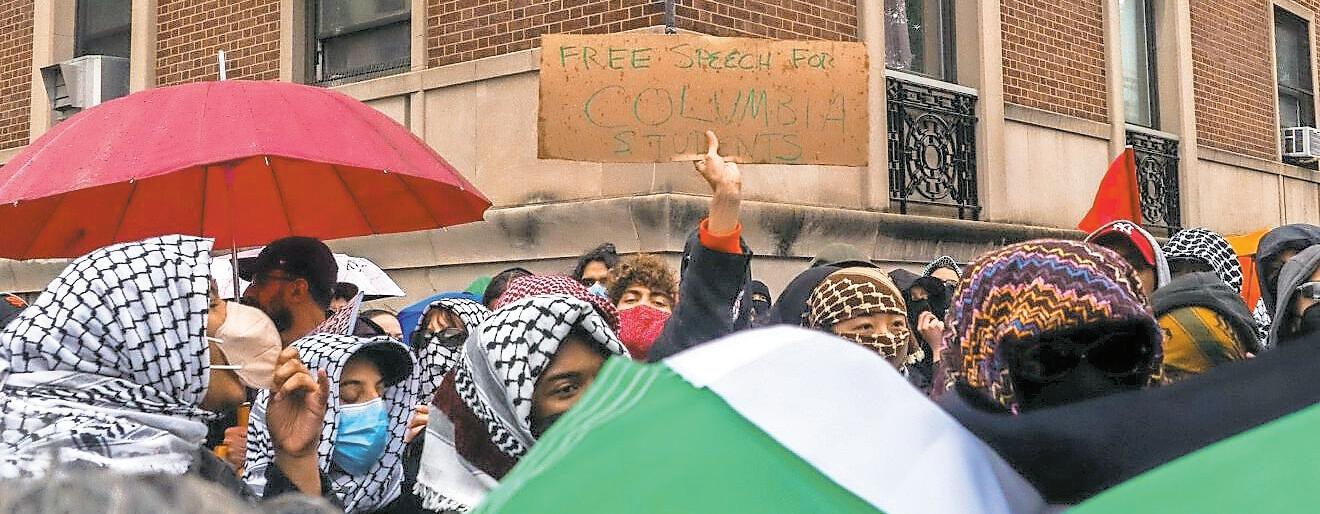
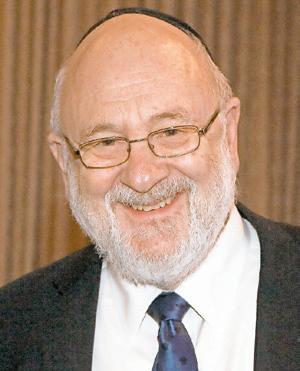
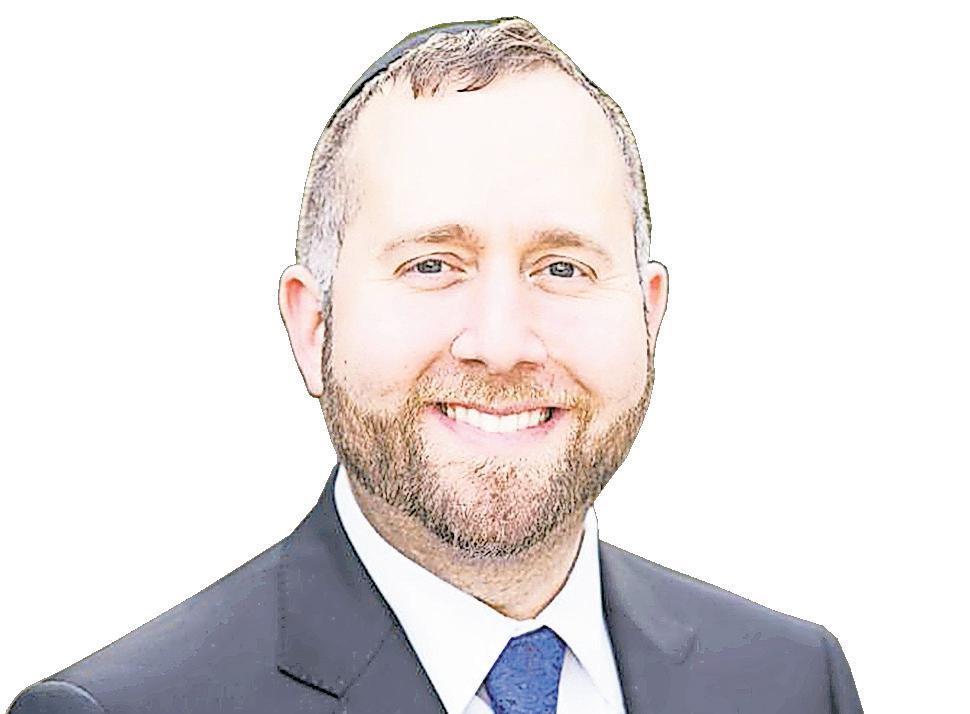
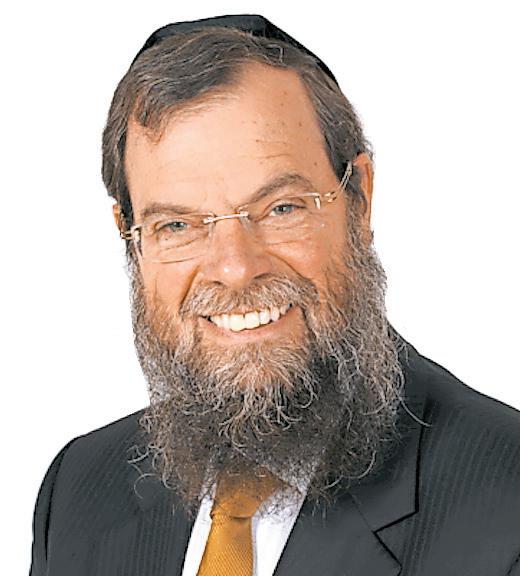







Qatar, the Jew-hating and Hamasloving uber-wealthy emirate that’s been buying US influence for years, may be preparing to call in the chips it’s put down on New York City, should anti-Israel socialist Zohran Mamdani win City Hall in November’s election.
Not only have members of the Qatari elite been lavishing millions on the film-making enterprises of Mira Nair, Mamdani’s mother, but the sister of the ruling emir has been pumping Mamdani’s candidacy on social media, according reports in the NY Post and Jewish Insider.
Sheikha Al-Mayassa bint Hamad Al-Thani, sister to ruling emir Sheikh Tamim bin Hamad Al Thani, and state-funded cultural institutions she controls have been surging cash to Nair at least since 2009. As reported on page 2 of this week’s Jewish Star, Qatar plays a long game in its influence peddling.
“They are buying somebody who is willing to be bought and at the time of their choosing they will ask for what they want,” explained Danielle Pletka, a foreign policy expert at the American Enterprise Institute, of Nair’s Qatar ties. “They need a

rainbow coalition of people who will support the ideology they promote — sometimes it will be Islamism, sometimes it will be antisemitism, sometimes it will be anti-Israel.”
Among several examples cited by the Post, Doha Film Institute paid the entire $15 million budget of one of Nair’s first films, “The Reluctant Fundamentalist,” which had previously struggled to obtain financing, the Post said. It tells the story of a Pakistani im-
migrant who suffers mistreatment at the hands of US authorities after 9/11.
Since mid-June, Sheikha Al-Thani has been promoting Mamdani’s mayoral candidacy on social media, boosting news of favorable polling on Instagram and posting fire emojis under a TikTok video of him embracing Nair.
The filmmaker did not respond to repeated requests for comment, nor did the Qatari entities that have financed her work.
Critics have called Qatar “America’s ultimate ‘frenemy’,” as it provides support to anti-US Islamist organizations while simultaneously hosting an American airbase.
Jonathan Schanzer, executive director of Foundation for the Defense of Democracies, called it “both arsonist and firefighter” — backing destabilizing organizations like Hamas and the Taliban, then offering itself as a mediator with the groups on behalf of the West,
including in hostage negotiations. Schanzer said it was concerning only “one degree of separation” may exist between the emirate’s ruling elite the mayor of America’s biggest city, given how the Qataris have used their country’s vast wealth to bribe exNew Jersey Sen. Bob Menendez and figures in the European Parliament.
The Post noted that “there is no publicly available evidence of a direct relationship between Mamdani and the Qatari regime. The assemblyman maintained he had never traveled to Qatar, nor received direct financial assistance from the country’s institutions.
“But his campaign declined to answer whether he had received such assistance from his mother, or whether he had had contact with the sheikha, and would not directly condemn the Al-Thani family’s rule — only attesting to ‘his belief in universal human rights and the freedom to advocate for justice everywhere’.”
“The attempt to weaponize his mother’s career against him is an insult to voters who care about actual issues, not manufactured distractions,” Mamdani campaign spokeswoman Dora Pekec told the Post.
By Steve Linde, JNS
On Sept. 1, the Jerusalem-based Koren Publishers released what they’re billing as Rabbi Jonathan Sacks’ greatest work — “The Koren Shalem Humash.”
Rabbi Sacks’ magnum opus, whose full title is “The Koren Shalem Humash With Rashi and Onkelos: Translation and Commentary by Rabbi Lord Jonathan Sacks (The Magerman Edition),” features the legendary former British chief rabbi’s translation of all five books of Moses presented in plain, readable English.
Sadly, Sacks was unable to complete the mission before his death on Nov. 7, 2020, at the age of 72. The new chumash was painstakingly collated posthumously by a group of scholars who


also sifted through 40 years of the rabbi’s books, essays, lectures and media appearances to find “the perfect blend of contemporary and ancient wisdom.”
The Koren team, in partnership with The Rabbi Sacks Legacy, crafted this chumash to make Rabbi Sacks’ teachings more accessible than ever, ensuring that his unique voice continues to guide future generations.
“For decades, Rabbi Lord Jonathan Sacks zt”l inspired the Jewish world with his profound wisdom, bridging ancient tradition with contemporary thought,” Koren states. “More than just a book, the ‘Koren Shalem Humash’ is a gateway to Rabbi Sacks’ enduring vision of Judaism —
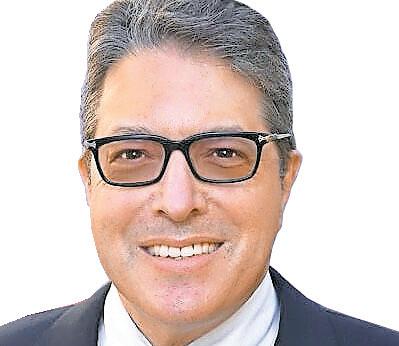
For many years, the tiny Gulf country of Qatar flew under the radar. After all, why should a country that has fewer citizens than Lexington, Ky., make waves, garner publicity or be on the tip of everyone’s tongue?
Now, it seems, that more and more people are beginning to speak up about Qatar’s regime, and its public condemnation of Israel and praise of Hamas after the terrorist attacks in southern Israel on Oct. 7, 2023.
Yes, there are a few lone voices out there, such as Yigal Carmon of the Middle East Media Research Institute (MEMRI) and journalist Benjamin Weinthal at the Middle East Forum, who have been pointing out the depths of Qatar’s nefariousness for years. Yet for the most part, the chorus of critics is a more recent phenomenon.
Sometimes, an avalanche does start with a few snowballs. Sometimes, persistence does overcome resistance (or bribery). Last month, the Free Press published a comprehensive exposé of Qatar’s malign influence peddling with the straightforward title: “How Qatar Bought America.”
The bad press and critical voices are nothing that the Qatari regime would be particularly pleased about. Qatar has been happy to use its vast wealth to infiltrate many aspects of American and Western society by flying under the radar. Qatar’s unearned wealth may be built upon its liquified natural gas reserves, but its biggest export is not natural gas. Qatar’s biggest export is terrorism, antisemitic propaganda and jihadi Islamism, Wahhabi-style.
The case against Qatar has become more vocal recently, as expressed in a number of articles and posts on X (though posts critical of Qatar seem to be suppressed by the site’s algorithm). Jonathan Schanzer at the Foundation for the Defense of Democracy, a longtime critic of Qatar, recently wrote an excellent piece in Commentary titled, “Catering to
Qatar. Why does everybody bow before this terror-supporting country?”
MEMRI also recently published a piece I wrote laying out many of Qatar’s evil dealings: “Qatar for Beginners: The Evil Regime Behind AlJazeera.”
With its recent offer of donating a “flying palace” for President Donald Trump to use as Air Force One, Doha may have finally jumped the shark in weaponizing its wealth. Ironically, Qatar, which has taken such great pains to fly under the radar, will be on the radar with each flight of the highest-profile jet in the world. Perhaps it should have considered gifting the president a stealth bomber instead.
While the Gulf state may be one of the leading funders and promoters of jihadi Islamism on the planet, it is not an asset to the world. So, how do you solve a problem like Qatar, especially if overt, unilateral action from the US States is but a remote possibility?
Here are a few possibilities, scenarios and suggestions.
Under this scenario, Qatar would repent, see the light and make a switch. This would mean major changes in Qatari policies, including joining the Abraham Accords, ending its funding of Islamist terrorist groups, ending its funding of Islamist propaganda abroad, including the attempt to co-opt American colleges, banning the Muslim Brotherhood and shutting down Al Jazeera or overhauling it completely.
How likely is it that Qatar will, of its own accord, have a change of heart and join the family of civilized nations? Not bloody likely.
Here’s another unlikely scenario: the nations of the world, led by the United States and the other Gulf countries, get fed up with Qatar’s export of terrorism and Islamism, and a full-court press of unified, international pressure causes internal policy changes or regime change.
Of course, it should be within the remit of the United Nations to put pressure on rogue nations, but the international body has become such a colossal failure that it seems to have become the exact opposite of what it is supposed to be.

Perhaps the biggest leverage the United States holds is the Al Udeid Air Base. The United States needs to develop a Plan B, including shuttering and/or moving the base or even extra-territorializing it, and it needs to let Qatar understand that this is a real possibility if it doesn’t play ball.
While the Pentagon brass undoubtedly love Qatari cash and not having to pay for the base out of its budget, it has been reported that Qatar placed limitations on the American use of the base, for example, categorically forbidding it from being used for any possible actions directed toward the Iranian regime.
Having a foreign country handcuff what the US military can do on its bases represents a serious impediment to implementing strategy in the region.
Is it likely that the current US government would use the Al Udeid base as leverage? No, and if the United States won’t pressure Qatar, neither will smaller countries.
Since the power of Qatar comes from its vast wealth, eliminating that wealth would be a scenario to stop its malign activities. Stop its liquified natural gas exports and you stop its export of terrorism and jihadi Islamism. Eliminate Qatari wealth, and take away its most powerful weapon, its only weapon.
Replacing fossil fuels with alternative sources of energy could help make the need for gas obsolete. This
could also ultimately be good for the environment, assuming we can figure out a way to avoid Jevons’ Paradox.
Additionally, if the United States designated Qatar a state sponsor of terrorism, sanctioned the country and froze its assets, this would quickly limit Qatar’s wealth-related mischief. Though under such a scenario, Qatar would likely try to increase its exports to rogue nations like China.
Lawsuits in the United States and elsewhere could have an impact. If American citizens who have been victimized by Qatar-funded terrorism were allowed to sue the government of Qatar, this could help stem the flow of Qatari cash and, in theory at least, serve as a deterrent for Qatar to continue financing terrorism.
A more novel solution would be for surrounding countries, tired of Qatar’s double-dealing, to tap into the Qatari/Iranian natural gas field using remote tunneling technology. It could be done from neighboring countries such as Saudi Arabia, the United Arab Emirates or Bahrain, or even from further afield.
Another way to eliminate Qatar’s “superpower” would be to coordinate a series of cyberattacks that would expropriate Qatar’s unearned wealth, drain its banks and create asset forfeiture on a massive scale. If Qatar doesn’t have the wealth to weaponize, it won’t be able to cause as much mischief in the region and the Western world, and its malign influence will die out.
The corrupt Al-Thani family runs Qatar like a mafia family. Regional actors who have had enough of the Al-Thanis’ malevolence could come together and take down the current regime. No need to do it directly or overtly, proxies are the name of the game in the region and shadowy proxies, funded by dark money, could be used to effect regime change either from within or without.
Almost 90% of Qatar’s population are foreign workers, some of whom are kept in slave-like conditions. Through proxy funding, including the use of expropriated Qatari funds, and targeted cyberattacks, a slave revolt could cooperate with friendly regional powers to remove the cancer of the Al-Thani regime and to replace it with a government that has zero tolerance for jihadi Islamism and whose goal is regional peace and cooperation, not killing Jews and annihilating Israel.
Perhaps the most elegant solution to the problem of Qatar is for Qatar to disappear.
For all the talk of Israel’s not being a “legitimate country” and of “wiping Israel off the map,” the slave-state of Qatar has no real justification to exist. Surrounding countries, like Saudi Arabia, the United Arab Emirates or Bahrain, could simply annex it. Historically, Qatar was a part of Bahrain. A clan rivalry is the only reason it eventually devolved from Bahrain, but ancient clan rivalries are no reason to let a rogue regime stand in the way of regional prosperity in the 21st century.
Qatar is a state-sponsor of terrorism that ordered Hamas to keep the hostages and is directly responsible for the Israeli captives being tortured and languishing in Gaza’s dungeons; it is the arsonist who wants to take credit for putting out the fire it lit and stoked.
In the past, the Qatari defense minister Sa’oud Aal Thani has said: “We are all Hamas.”
No, we’re not, and one way or another, it’s time to #StopQatar.
John Mirisch is chief policy officer for ICAN (Israeli-American Civic Action Network). Write: ColumnistThe JewishStar.com
By Yaakov Lappin, JNS
A conference hosted on June 11 in the American capital by the Arab Center Washington, a think tank funded by Qatar and founded in Doha, serves as a case study in the Gulf state’s “soft power strategy” in the United States.
Lenny Ben-David, esearch and diplomacy fellow at the Jerusalem Center for Security and Foreign Affairs who previously served for 25 years at AIPAC and as a senior Israeli diplomat in the Israeli Embassy in Washington, published a report days before the conference, revealing that the Arab Center Washington DC is affiliated with the Qatari Arab Center for Research and Policy Studies. The report described both organizations as “cornerstones of the Qatari royal enterprises, led and funded by the Qatar Foundation.”
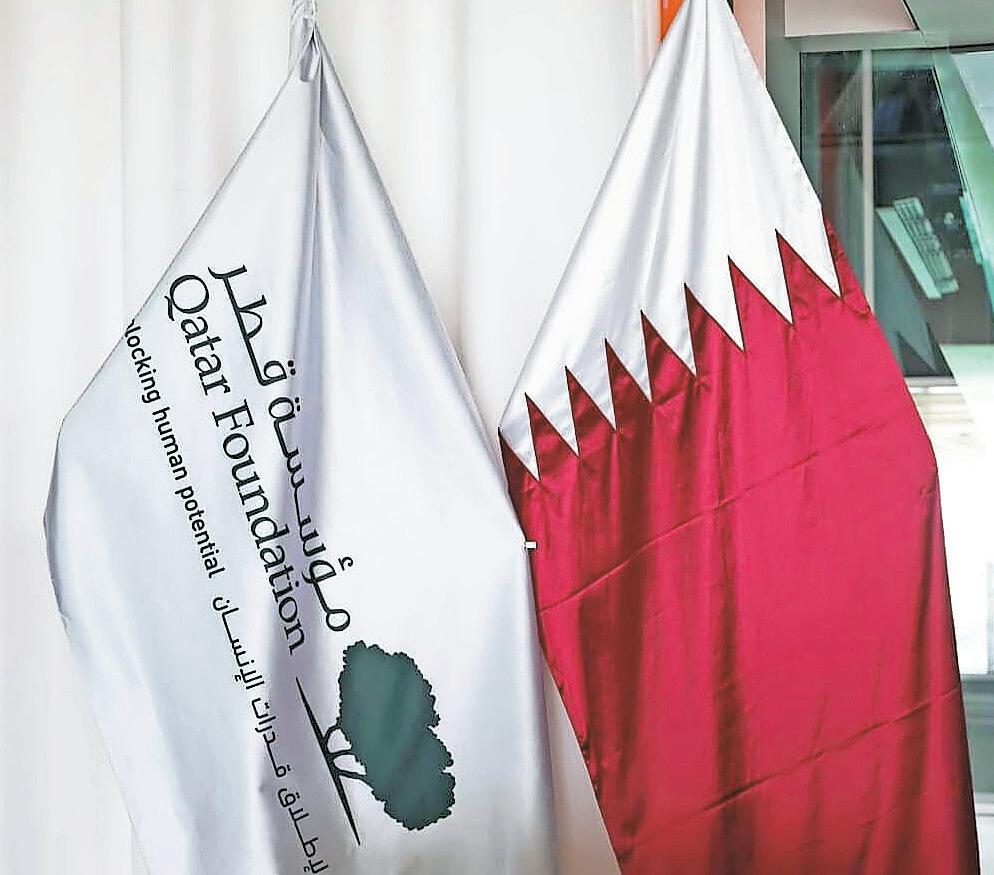
The June conference focused on what it termed “Israel’s Destruction of Gaza” and promoted accusations of “genocide” against the Jewish state. While the event itself caused few ripples in the mainstream media, BenDavid warned in an interview with JNS that it highlights a deeper, more patient influence campaign.
This campaign targets what Ben-David called the “second-tier level” of influence: Staffers of members of Congress, graduate students and academics who will become “the foreign policy establishment of tomorrow.”
By pouring billions of dollars into elite American universities and think tanks, Qatar is not just purchasing goodwill; it is actively shaping the intellectual ecosystem and promoting a specific, anti-Israel ideology rooted
in the Muslim Brotherhood, of which it is a leading state sponsor, he warned.
According to Ben-David, the Arab Center Washington DC conference appeared to be an insular affair, an “echo chamber” with a “relatively small” crowd. He noted a pervasive sense of frustration among the speakers that their protests and demonstrations against Israel had not had a greater effect.
One of the goals of the conference, BenDavid argued, was to “hold up the flag for their Qatari benefactors: ‘Look what we did’!” Despite their frustrations, Ben-David, who followed the conference via its video feed, said that speakers were encouraged by polling of Americans. The polls, they said, were “going their way,” and speakers felt they were successfully “chipping away” at American
See How Qatar influences on page 8
mountsinai.org/southnassau

Imagine a teenager: juggling schoolwork, hockey practice, music lessons or preparing for a big exam. For most young people, life is about learning, growing and exploring the world.
My eight teenage grandchildren spend their afternoons focused on studies, charitable work and sports, dreaming of college, careers and marriage when the time is right. They are guided by curiosity and ambition, not by the expectation of dying in the name of a political cause.
Now imagine a very different world.
According to Palestinian Media Watch, Palestinian Authority Ramallah district governor Laila Ghannam praised families on July 27 whose children sacrificed their high-school diplomas for the “greater shahada” of martyrdom — comparing funerals to joyous weddings held in Paradise. This is a society in which children are taught that the highest honor is not learning, creating or building, but killing or being killed in the service of a political struggle.
For decades, Palestinian Authority leaders have elevated martyrdom above all else.
In 2015, Fatah declared that “Martyrdom-death for Palestine is a destiny we assume willingly and serenely,” while in 2020, Deputy Mahmoud Al-Aloul praised martyrs as “the most
honorable and noble of people.” Meanwhile, PA schoolbooks continue to indoctrinate children with the message that the ultimate moral and religious duty is to die for the cause, rather than to live, learn and build a future.
The Institute for Monitoring Peace and Cultural Tolerance in School Education (IMPACT-se) has documented Palestinian textbooks that omit Israel entirely from maps, portraying the land as an eternal single Palestine; include arithmetic problems that count martyrs killed over time; and describe youth deaths as “fuel” powering the intifada, praising them as sacred sacrifices.
Marcus Sheff, CEO of the Institute for Monitoring Peace and Cultural Tolerance in School Education (IMPACT-se), warns that this is more than poor pedagogy; it’s indoctrination. He notes that “textbooks are uniquely authoritative in this region … children learn what is in their books, what is on their desks … a whole subject is connected to a textbook.”
The PA doesn’t just teach martyrdom in textbooks. It institutionalizes it throughout society:
•Parks, streets and schools are favored memorials to terrorists in Ramallah and other PA-controlled areas. For example, Ayyat al-Akhras, a 17-yearold who carried out a 2002 suicide bombing in Jerusalem, killing three civilians, is celebrated in PA media and school curricula. Summer camps and public ceremonies honor her “sacrifice,” presenting her as a role model for youth. Similarly, Dalal Mughrabi, the mastermind of the 1978 Coastal
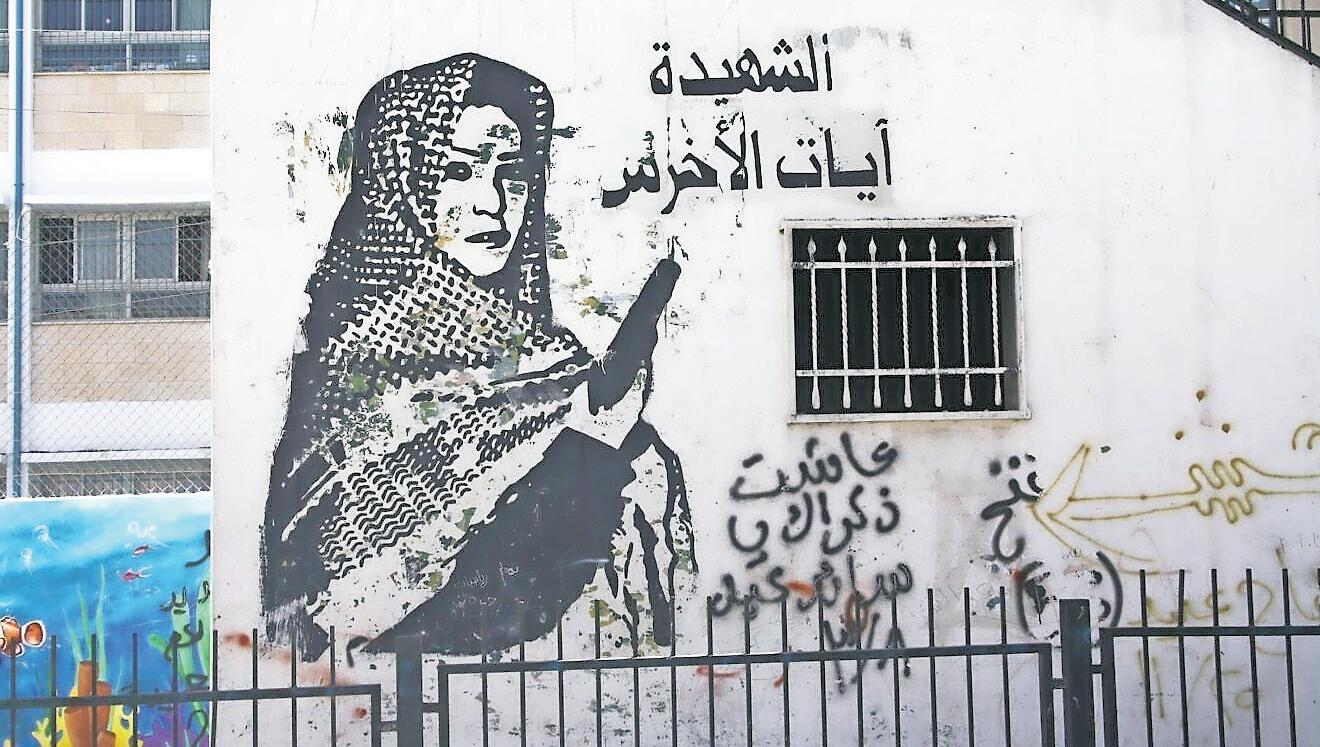
Road Massacre that killed 38 civilians, including 13 children, is memorialized in schools and public spaces.
•Funerals of those labeled “martyrs” are treated as national festivals, complete with flags, state sponsorship and attendance by senior officials.
•There are financial rewards. Through the so-called “Martyrs Fund,” families of terrorists killed or imprisoned while attacking Israelis receive monthly stipends, often higher than average Palestinian wages. This reinforces the idea that violence is not only honorable but profitable.
•Summer camps sponsored by Fatah and Hamas train children in paramilitary drills while glorifying martyrdom, cultivating the notion that self-sacrifice through violence is the highest aspiration.

These practices send a clear message: in Palestinian civic life, heroism is defined by the willingness to kill or die, not by education, creativity or constructive civic engagement.
Celebrating martyrdom indoctrinates a culture of sacrifice over citizenship. A state must cultivate critical thinking, peaceful coexistence and mutual recognition — not valorize the destruction of life. Until Palestinian youth are re-educated away from martyrdom narratives, their leaders will be unable to claim moral or civic legitimacy in the international sphere.
Western institutions have begun pushing back. In Congress, the Peace and Tolerance in Palestinian Education Act passed the House in November 2023. It mandates State Department reporting on PA.curriculum materials, including
whether they incite violence and whether US aid supports such content.
Meanwhile, other regional examples show that reform is possible. Saudi Arabia, the United Arab Emirates, Morocco and Egypt have all removed violent or antisemitic materials from schoolbooks in recent years. The contrast with Palestinian curricula — and the continued naming of streets and camps after teenage terrorists like Ayyat al-Akhras — could not be sharper.
Critics argue that real change must be internal. Michael Milshtein of the Moshe Dayan Center contends that reform requires a German-style reckoning from within Palestinian society, not just cosmetic edits to textbooks.
The story of Ayyat al-Akhras exemplifies the human consequences of this glorification.
At 17, she could have been finishing high school, pursuing a career or simply living a life of learning and growth. Instead, she carried out a suicide bombing, killing civilians, and is now celebrated as a national hero by Palestinian authorities. Her example is shown to children in textbooks, youth programs and public ceremonies, teaching them that the highest honor a teenager can achieve is the killing of innocents.
For Western audiences, this reality is difficult to grasp: children being taught that death in violence is preferable to life, education and opportunity. Until Palestinian leaders reject this narrative and honor life over death, the dream of a peaceful, viable Palestinian state will remain beyond reach.
Columnist@TheJewishStar.com

By Ed Weintrob, The Jewish Star
Jerome Lippman, publisher of the Long Island Jewish World, was eulogized on Tuesday as “an exceptionally good man, and his memory will always be for a blessing.”
The sentiment was voiced at Lippman’s levya by New York State Comptroller Thomas DiNapoli, a longtime friend.
“He was fiercely devoted to being an independent Jewish journalist,” DiNapoli said. “That did not always win him friends in the community, but no one could question his integrity. And whatever his editorial viewpoint, he always strived to present stories and columns from all perspectives.”
“I will always remember Jerry as a man who loved his children, was proud to be a Jew, and someone who looked at our world with a sense of wonder, curiosity and concern each and every day,” he said.
DiNapoli recalled that his last conversation with Lippman “ended with his favorite line — how many of you heard him say this? — ‘We got out another issue this week’.”
His daughter Sarah Lippman Silverman said friends and colleagues would honor her father by publishing two special editions of his newspaper.
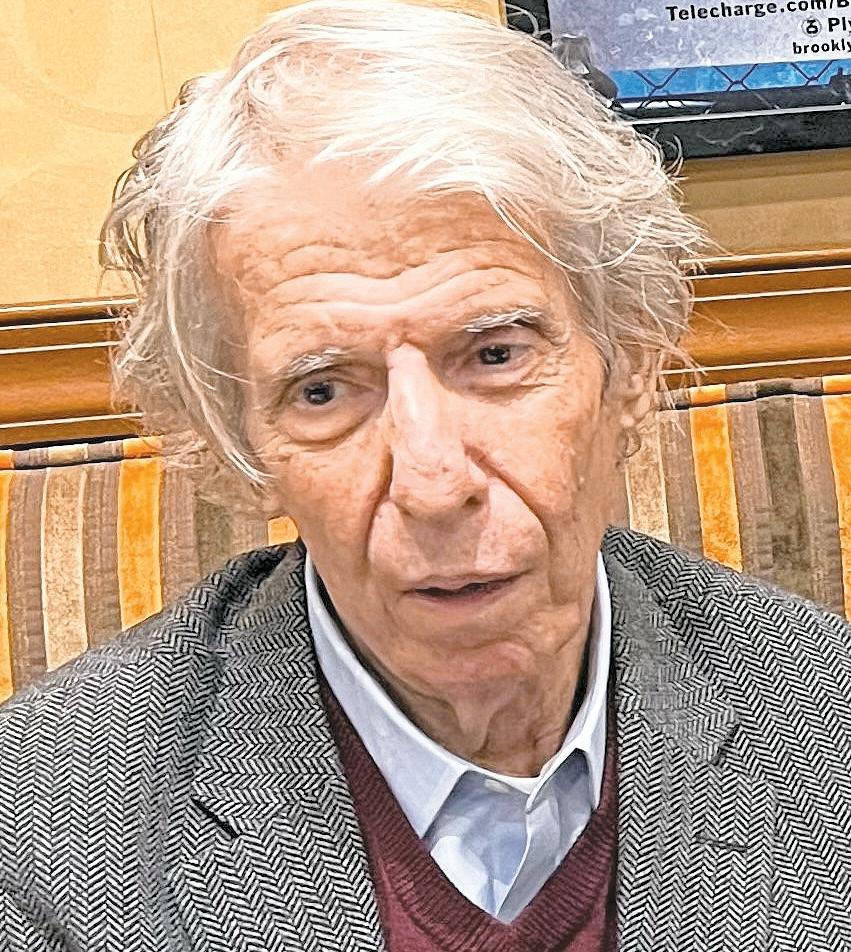
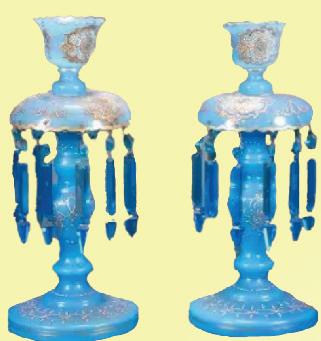











By Tania Shalom Michaelian, JNS
On Sept. 1, the excited chatter of youth reunited after summer vacations and almost 23 months of war will echo across schools in Israel. But for Leni and Roii Adar, “back to school” means more than sharpened pencils and new backpacks.
For them, and tens of thousands of other children in northern Israel, it is the hope of reclaiming a normal childhood after being uprooted from their homes under fire from Hezbollah nearly two years ago.
“My only wish for them is that they get to start — and finish — this year in the same school,” says their grandmother Daniella, whose home in Yesud HaMa’ala, the first modern Jewish community in the Hula Valley, became a sanctuary during the upheaval. For months, the children slept in her bed at night, finding safety and comfort.
For 13-year-old Roii and his 10-yearold sister, Mia, from Kibbutz Dafna, and their 8-year-old cousin Leni from Kibbutz Shamir, the past two years have meant abandoned classrooms, lost friends and the constant question of when, or if, they would ever return home.
For Roii and Mia, the ordeal began on Oct. 7, 2023, when their families were evacuated from Dafna following the massacres by Hamas in the Western Negev and the subsequent Hezbollah bombardments along the northern border.
Dafna, established in 1939 as a “Tower and Stockade” community a few miles east of Kiryat Shmona, was
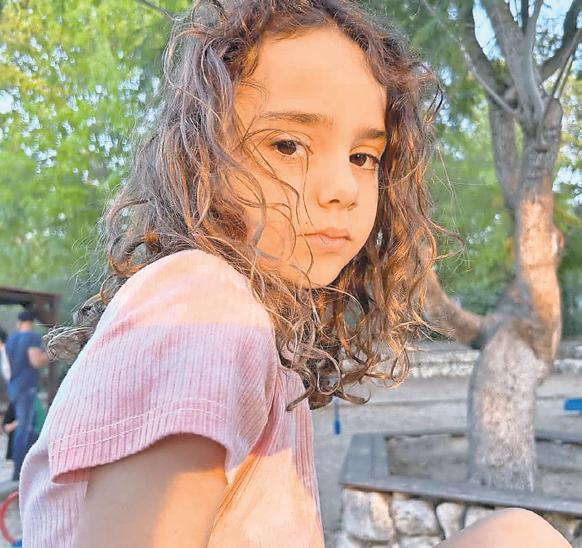
officially evacuated along with other communities on the northern frontier and in the Upper Galilee.
“When my parents woke me up, they told me we were going on a fun day trip, like we often do. I only found out we weren’t going home a few hours after we left,” Mia remembers.
She adds, “At first, the evacuation felt almost like an adventure, at least for the children.”
“It was fun,” Roii recalls. “It felt like a holiday. No school, big family meals, three of my friends from Dafna were there. We met every day.”
When the fighting dragged on, the parents sought a more permanent solution and moved to Ein Gev on the Sea of Galilee. The children attended a popup school staffed by soldier-teachers.
“Those first months were chaotic,” explains their father, Tom. “School wasn’t a top priority for anyone.”
For the children, the lack of stability was jarring. “I had only one friend there,” says Roii.

Mia adds that “it wasn’t a great school. The teachers tried to talk to us about the situation, but it didn’t help. I didn’t feel good inside.”
A few months later, they moved again, this time to Kibbutz Ha’on. Most of their friends from Kibbutz Dafna also relocated, along with experienced teachers, some of whom they knew from home.
At Ha’on, the school day ran until 1 pm, followed by meals and afternoons of swimming and play on the expansive grass. “It was the first time since the war began that they felt like kids again,” Tom says. But living conditions were tight: The family shared one room, with no privacy. Arguments flared. Some tough decisions had to be made.
“We realized it was more important to restore a healthy family framework than just keep them happy,” Tom explains. “We decided for the sake of our family, we had to move somewhere that offered more privacy and more rooms.”

At first, the kids were hesitant to leave Ha’on, fearing that they’d need to make new friends and navigate an unfamiliar school yet again. Their parents assured them that they could move back if they were unhappy. Eventually, the family rented a home near Daniella in Yesud Hamaala. The children found new friends, and their father reconnected with childhood companions. At night, Daniella’s home, with a safe room within the house, remained a refuge. “They felt
safe only when we were all together,” she says.
Last September, Roii was due to start junior high at Dafna’s regional school. He was disappointed that the school remained closed and that a temporary junior high had been opened for children of the region in the industrial park near Rosh Pina.
However, when a missile tore through the roof of the junior high sports hall at Kibbutz Dafna — fortu-
See Schools on page 8
By Judy Lash Balint, JNS
For one school near the Gaza border, the first day of classes on Mondayt was more than a return to routine — it was a symbol of survival and resilience.
The Shachar Eshkol Elementary School, closed since the Oct. 7, 2023, attacks, reopened its doors with US Ambassador Mike Huckabee on hand to mark the occasion.
As buses arrived carrying students from Gaza Envelope communities, Huckabee was greeted warmly by teachers and parents. Speaking to reporters, he said the safety and freedom of Israeli children remained a top priority.
“Israel has to get the hostages back and Israel has to defeat Hamas,” he said. “Those are the two goals President Trump has made very clear. How that happens is for Israel to decide, but those two things must happen to protect these children and the children throughout the land of Israel. Our place is to stand with our friends. Israel didn’t attack anyone. It was attacked viciously, brutally, unmercifully. They have every right to make sure Hamas never harms them again.”
The campus was decorated with colorful streamers and signs welcoming students back. Children in white T-shirts with the school logo hugged friends and held hands as they entered the gates. One father called out in Hebrew toward the ambassador, “Tell him I love him!”
Huckabee joined hundreds of students, teachers and parents for the opening ceremony, applauding as first graders filed in to the sound of iconic Israeli songs marking the start of their school journey.
Principal Eyal Dvori addressed the crowd and said he was excited to welcome the first graders and returning students, but acknowledged the deep wounds that remain in the community.
Switching to English, he reminded those
gathered that the pain of Oct. 7 is still very real.
“Our very own students and graduates were counted among the killed and the kidnapped of that horrific day,” he said. “The pain is deeply personal. Three of our teachers were widowed. One of them, Yaffa Rodayeff from Kibbutz Nir Yitzhak, is here today, still waiting for the return of the body of her husband, Lior.”
Dvori said that despite the losses, the community remains committed to raising children without hatred. “We are still here, in strong spirit, continuing to raise our children not to hate, to grow and not to break. We choose life, and we will continue to do so,” he said, drawing sustained applause.
Speaking to the crowd through a translator, Huckabee praised the community’s determination. “It’s such an honor to be with you on the very first day of your school year,” he said.
“For many of you, it’s more than just the beginning of school; it’s the beginning of a new chapter for you and for the State of Israel. Some very evil people tried to keep you from having this day. But what I admire most about my Israeli friends is that no matter how many ways people try to stop you, you stand back up and keep going.”
“The most important thing in any of our lives is not how many times someone knocks you down, it’s how many times you get back up — one more time,” the ambassador added.
Turning directly to the students, he said, “I love Israel and I love being with you here today. I hope you have a wonderful school year, and I want you to know that your friends in the United States love you, pray for you, and believe that your future is brighter than you ever dreamed.”
Michal Uziyahu, head of the Eshkol Regional Council, reminded the crowd that their community is still waiting for the return of hostages.
“We remember that we’re still waiting for some
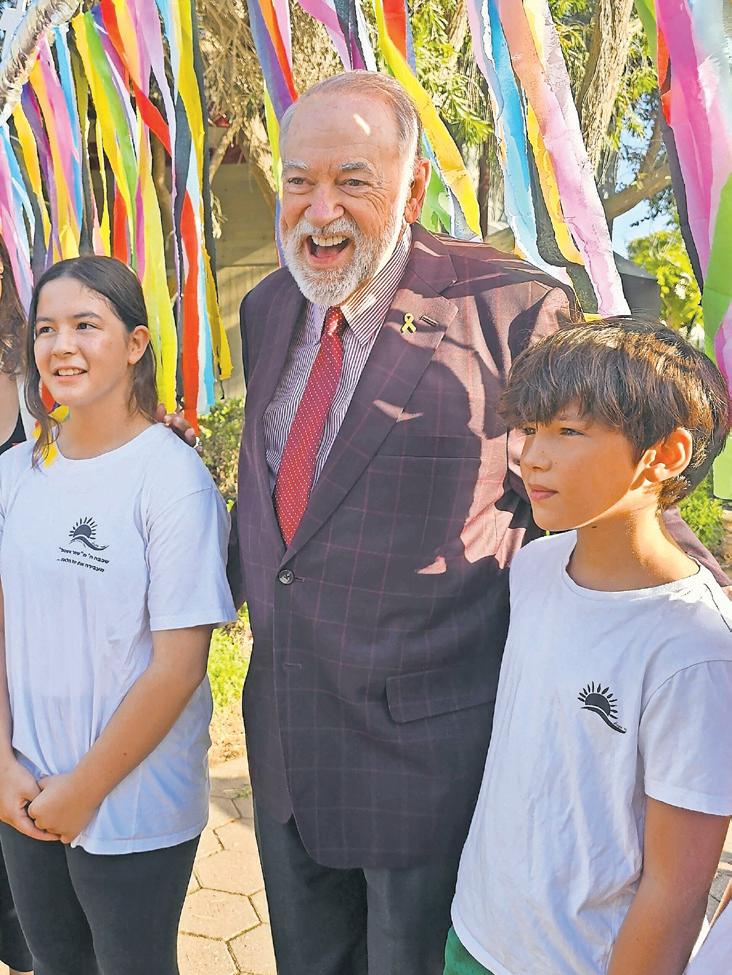
students to return to us,” she said. “There are still 48 hostages, including 15 from our communities. We are not complete without them.”
She told the students that the eyes of Israel and the Jewish people are on them because their community has become a symbol of hope and courage.
“It’s a huge responsibility, but it also gives us a lot of strength,” she said. Uziyahu thanked Huckabee for attending the event. “Ambassador Huckabee is a true friend who, though not Jewish, has been connected to Israel for many years,” she said.
Uziyahu thanked the IDF for providing the security that made the reopening possible. “IDF Chief of Staff Eyal Zamir told me recently that seeing the Eshkol Council opening the school year is a marker of their victory,” she said.
Uziyahu expressed appreciation to representatives of Jewish National Fund-USA, whose support has been vital to the region for years, calling their presence a reminder of the support from Jews in the Diaspora.
Tali Tzur, Chief Israel Officer of Jewish National Fund-USA, said that Sept. 1 was “a defining moment for Israel and the State of Israel as we reopen the schools in the Gaza envelope after the devastating times we experienced. The kids are back, the smiles are back and the region will recover.”
Addressing Huckabee in English, Uziyahu added, “We always say that the worst thing in an emergency is feeling helpless and alone. On Oct. 7, we felt it very strongly. But as you can see, we are far from helpless.
“We are not alone — we have very good friends like you. … They hurt us, but they did not break our spirit. Our spirit is strong — and we are not alone.”
Before leaving, Huckabee planted an olive tree in front of a protective wall built to shield the school from direct fire from Gaza. “This wall is a reminder that on this side of the border there is life and joy,” he said.
“Children are coming to school, preparing for a lifetime of leadership and a future they can be excited about. They did not look like children who were afraid. They know this wall is behind them, but their future is completely in front of them.”
Before departing the area, Huckabee was presented with a container of local olive oil, a token of gratitude and a symbol of the community’s determination to regrow and rebuild.
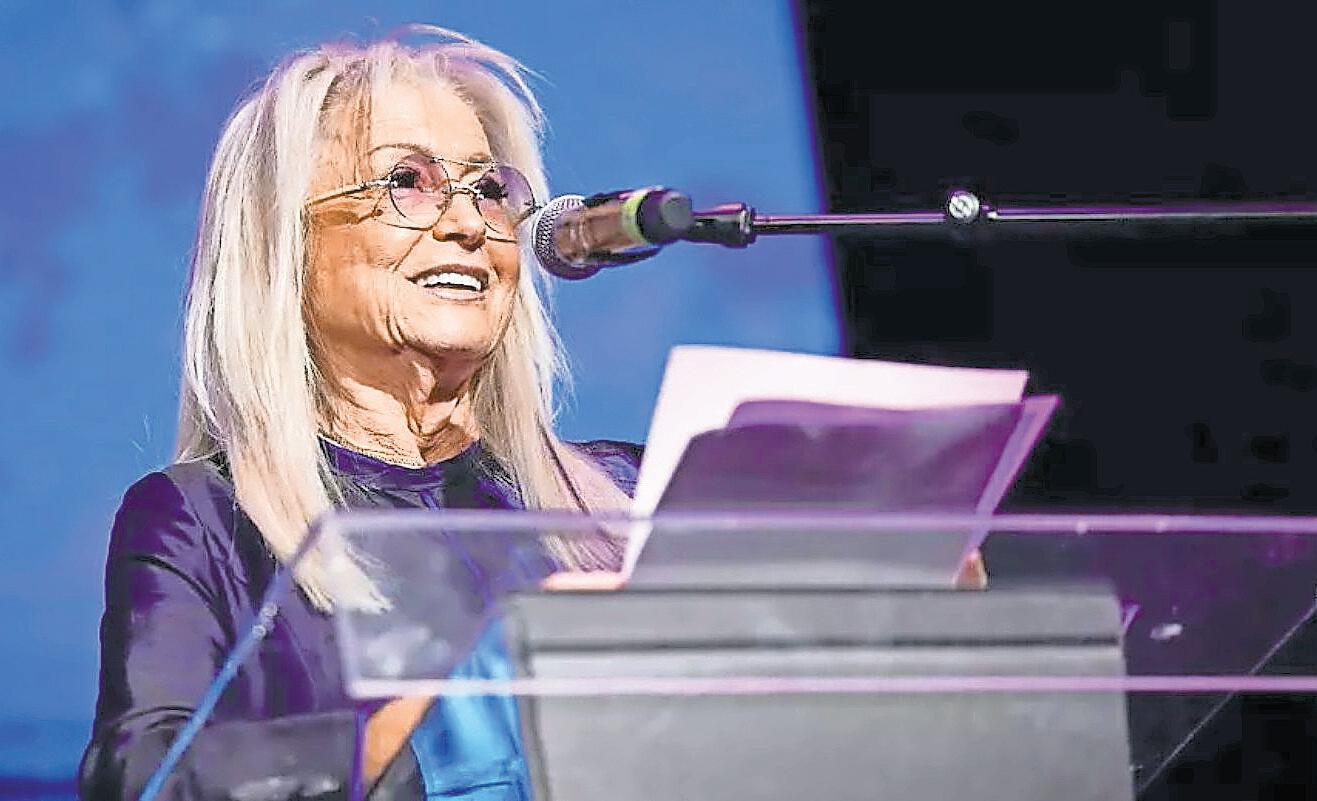
By Lidor Sultan, Israel Hayom
President Isaac Herzog announced on Sunday the award of the Israeli Presidential Medal of Honor to nine men and women who have made exceptional contributions to the State of Israel.
The medal winners are:
•Dr. Miriam Adelson, a pioneering scientist, physician and addiction treatment specialist who has devoted her life to groundbreaking research in the field of drug rehabilitation and fighting stigmas surrounding addiction. She is the publisher of the Israel Hayom daily newspaper.
•Dr. Mathias Döpfner, CEO of the German media group Axel Springer, is a brave voice against antisemitism and a staunch supporter of Israel. He has demonstrated unprecedented solidarity with Israel during the current war.
•Judge George Karra, the first Arab Christian to serve as a justice on the Supreme Court, is known for his courageous and fair rulings. He is a symbol of equality before the law and integration in Israeli society.
•Moti Malka, the founder of the Israeli Andalusian Orchestra, led the multicultural revolution in music. He made Andalusian music part of the Israeli cultural map.
•Professor Avi Ohry is one of the world’s leading rehabilitation physicians and experts in treating war-wounded individuals. A captive during the Yom Kippur War, he led rehabilitation medicine in Israel and rehabilitated thousands of patients.

•Professor Dina Porat, a leading Holocaust researcher who has written foundational books in the field, leads the fight against antisemitism. She serves as academic advisor at Yad Vashem.
•Galila Ron-Feder Amit, a leading children’s and youth author who has written hundreds of books that have shaped entire generations. Her works instill values of curiosity, tolerance and love of homeland.
•Sheikh Muwaffaq Tarif, the spiritual leader of the Druze community in Israel, leads a path of moderation and unity. A symbol of the covenant of life between the Druze community and the State of Israel.
•Dr. Yossi Vardi is instrumental in building Israel’s high-tech industry and founder of Mirabilis (ICQ). He invested in and established dozens of high-tech companies and serves as a mentor to thousands of entrepreneurs worldwide.
The Presidential Medal is awarded to those “Who through their talents, service or in any other way, made an outstanding contribution to the State of Israel or humanity.” The medal was the brainchild of Israel’s ninth president, Shimon Peres, and was first awarded in 2012.
Upon entering office, Herzog appointed an advisory committee, headed by retired Supreme Court Justice Professor Yoram Danziger, to recommend worthy candidates for the medal on a regular basis.
Since then, the president has awarded the medal to prominent figures in Israel and worldwide in various fields, including heads of state, key social figures from different sectors, and Jewish leaders in Israel and abroad.
The Presidential Medal will be awarded in a ceremony expected to take place at the President’s Residence in Jerusalem after the High Holidays.
Herzog personally notified each winner of his or her selection, and in each conversation, the president said: “In each and every one of you, I see a figure providing personal example. Your unique contribution is an example of activity worthy of special recognition.
“The State of Israel owes you deep gratitude for your work, for the uncompromising commitment to values of excellence, solidarity and innovation, and for your outstanding contribution to strengthening Israeli society and defending and advancing Israel’s reputation in the world.”
The president mentioned and emphasized that “even at these moments, the hostages remain in all our hearts — we do not forget them and continue to act and pray for their swift return.”

Continued from page 1
rooted in tradition and speaking powerfully to the challenges of today.”
Alan Sacks, who is eight years younger than his famous brother and serves as president of the Israel Board of The Rabbi Sacks Legacy, said that the chumash had been Rabbi Sacks’ “last major project.”
“His death came as a surprise in the sense that he did not realize how ill he was,” said his brother, a top attorney who made aliyah with his family in 1981 and lives in Jerusalem. “I think he did understand that [the chumash] was the last major project that he was going to undertake beyond all of the other activities that he was involved in, in terms of diplomacy and speaking on behalf of Israel and educating and so on.”
He said, “The chumash is a culmination of a life’s work on the part of Rabbi Sacks, synthesized into what is a rather hefty book. But I think that anyone who takes the time — and I imagine it’ll take time over the years to absorb everything that Rabbi Sacks has to say there — will come out with an added dimension of what it means to study the Torah in contemporary circumstances.”
Although Rabbi Sacks’ three brothers — Alan, Eliot and Brian — all made aliyah, he maintained close relationships with them and their families from his home in London and they visited one another often. Alan Sacks shared that he had accompanied his brother — “sometimes from close and sometimes from afar” — for more than 15 years in his weekly commentaries on the Torah that culminated in the chumash
“What we can see here is the integration of all of those thoughts in one volume,” he said. “As my brother tried to say, the Torah is a commentary on life and life is a commentary on the Torah. It’s extraordinary how contemporary the weekly parasha turned out to be in the hands or under the fingertips of my brother and this is what comes across so beautifully in this work.”
In their dedication, sponsors Debra and David Magerman of Philadelphia and Jerusalem offer thanks for having been blessed to have spent time with Rabbi Sacks and his wife, Lady Elaine Sacks.
“Learning from Rabbi Sacks is a privilege and pleasure he has shared with the world through his publications and public speaking,” they write.
“Spending time with Rabbi Sacks — the
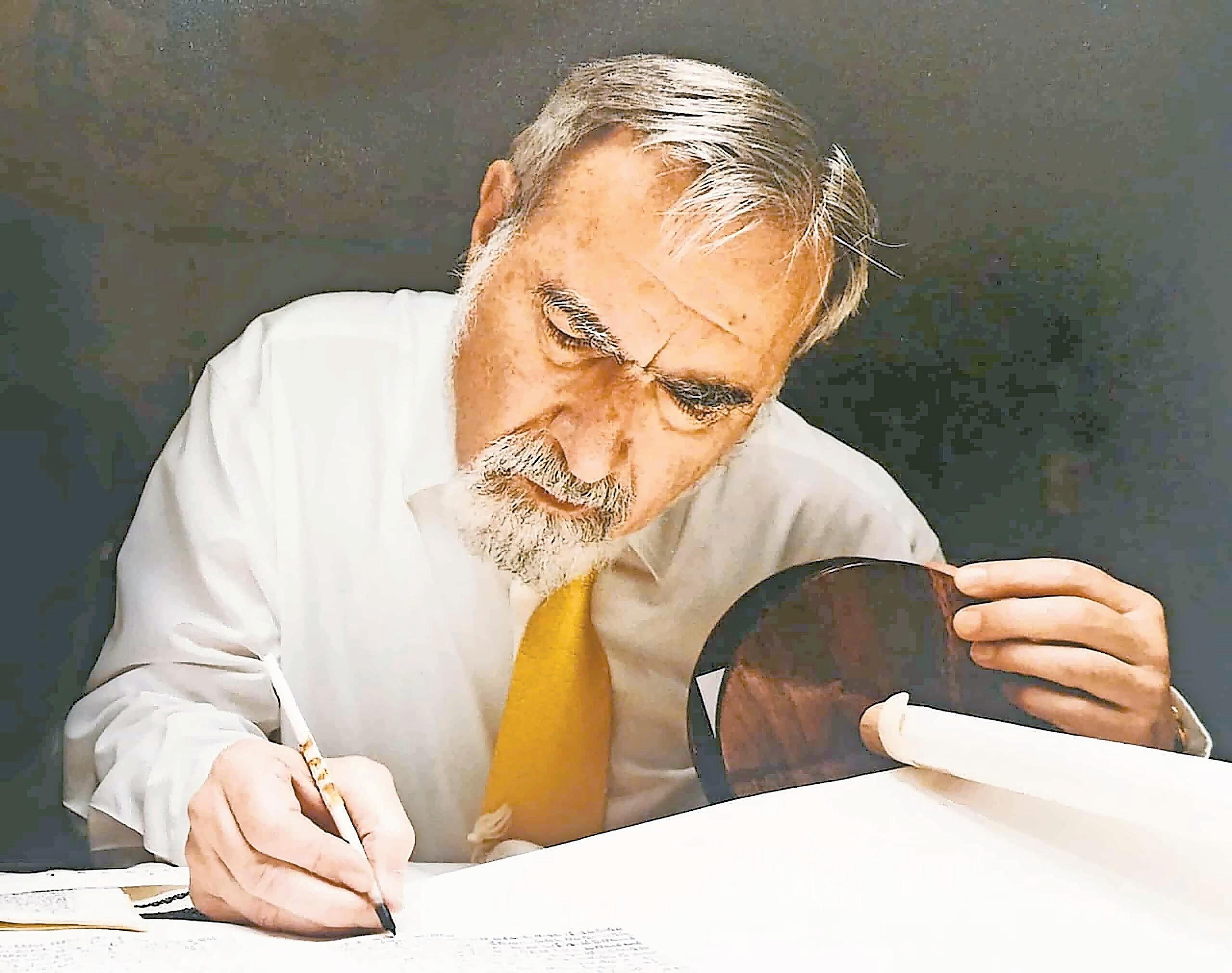
man, the beautiful neshama — is more rare and those experiences we had with him in our home and in our community, at Shabbat meals and on Shabbat afternoon walks, are priceless experiences we will never forget.”
Calling Rabbi Sacks “the authentic Torah voice for our generation, simultaneously steeped in Torah tradition and deeply engaged with people of all faiths,” they note, “He succinctly understood and eloquently conveyed both the particular Jewish identity of our sacred writings as well as their universal relevance.”
The Magermans conclude with a prayer that the new chumash “inspires us with new and old ways of thinking and ultimately brings us closer to the Redemption.”
Publisher Matthew Miller says the chumash is a reminder that while the rabbi’s living presence is no longer with us, “his Torah lives on and con-
tinues to grow in influence.”
“Rabbi Sacks was our guide through the bewildering thickets of modernity, our guide to a fresh and refreshing engagement with Torah, and we gratefully follow the path he has charted for us,” Miller writes. “We hope these writings will engage, provoke, and inspire the next generation of Torah scholars, teachers, laypeople, and indeed, all G-d-seekers.”
“In Judaism, we not only learn to live, we live to learn,” said Miller, citing a teaching by Rabbi Sacks. “In study, we make Torah real in the mind so that we can make it actual in the world.”
The Editor’s Note points out that Rabbi Sacks intended this chumash to be his “flagship project, one in which he could incorporate many of his timeless messages and ideas.”
After translating the chumash for “The Koren Tanakh” (published in Sept. 2021), Rabbi Sacks
Continued from page 2
support for Israel. This, Ben-David noted, was the “self-congratulatory aspect.”
The true impact of Qatar’s soft power, BenDavid argued, is not about swaying today’s headlines but rather about shaping the minds of tomorrow’s leaders.
“Members of Congress are not going to be attending that event, but there are staffers. There are graduate students. Georgetown University is one of the top schools feeding people into the foreign policy world. And so that’s where I believe their influence is,” he said.
This assessment is backed by extensive financial data. A 2022 report from the Network Contagion Research Institute identified Qatar as the single largest foreign donor to American universities, contributing at least $4.7 billion between 2001 and 2021.
Ben-David noted in his report that “the Qatar Foundation and its ACW and ACRPS affiliates provide a steady stream of ‘experts’ to editors, media, publications and speaking occasions in the United States.”
US Justice Department Foreign Agent records provided an example from October 2024. He said one of the letters on file stated, “As we approach the one-year anniversary of Oct. 7, the following Qatar Foundation experts are available to support your coverage of the Israel-Hamas conflict, Israel-Hizbullah con-
flict and regional repercussions. All experts are based in Doha (GMT+3) and available for virtual interviews. Their institutions are part of Qatar Foundation’s Education City.”
Qatar’s influence campaign is inseparable from its role as a primary state sponsor of the Muslim Brotherhood. A June 9, 2025, report by the Foundation for the Washington D.C.based Defense of Democracies (FDD), authored by Ben Cohen and Ahmad Sharawi, titled “10 Things to Know About the Muslim Brotherhood,” described the movement as being “dedicated to the remaking of society and government according to the dictates of Islamic law, or sharia.”
The FDD report noted that the Brotherhood’s worldview is inherently hostile to liberal democratic values and that “antisemitism is woven deeply into the Muslim Brotherhood’s worldview.”
Crucially, the report identified Qatar as a “leading supporter and exporter of Muslim Brotherhood ideology.” This support is both financial and political. According to the FDD, Qatar “pumped approximately $8 billion into Egypt’s Muslim Brotherhood government” after the 2011 Arab Spring and later “offered sanctuary to Egyptian Brotherhood members.”
Doha is also a key patron of Hamas, which report identified as “an outgrowth of the Muslim Brotherhood,” providing more than
began writing his commentary on the Torah, beginning with the book of Exodus.
“Regretfully, he was unable to see it to completion. The chumash editorial team at Koren, led by Rabbi Sacks’ niece Jessica Sacks, compiled the rest of the chumash commentary from his vast array of books, articles, commentaries and lectures.”
The Editor’s Note stresses, “The work was always done with Rabbi Sacks’ intention for the chumash commentary as our guiding light, mission statement and purpose. Great care was taken to present his invaluable ideas and messages in his own words, only adapting and shaping them to preserve his style in the new format.”
Among the wonderful bonuses in the chumash are the additions of Targum Onkelos, the authoritative Aramaic translation of the Torah written in the early second century, and Rashi’s comprehensive commentary from the 11th century presented in modern type.
In addition, following the chumash section are all the haftaroth, “according to the various customs of the Ashkenazim, Sepharadim and Yemenites.” Each haftara is accompanied by a short commentary originally written in Hebrew by Rabbi David Nativ for Koren’s “Humash Yisrael” and nicely translated by Rabbi Yedidya Naveh.
“We hope that these commentaries provide the reader with the context to appreciate the significance of the words of the prophets and their depth and timeless teachings,” the Editor’s Note concludes.
In his first chapter on Genesis, Rabbi Sacks notes, “Torah is G-d’s book of humanity and each of us is a chapter in its unfinished story. Its words form our covenant with Heaven. And as we listen and respond, we add our voice to the unbroken conversation between the Jewish people and its destiny.”
For those who have had the privilege of hearing Rabbi Sacks speak, in person or on video, when you read his writing, you can almost hear his elegant eloquence articulated in the King’s English.
When Jonathan Henry Sacks, Baron Sacks, died, King Charles wrote, “With his passing, the Jewish community, our nation and the entire world have lost a leader whose wisdom, scholarship and humanity were without equal.”
“The Koren Shalem Humash” is on sale at Amazon for $54.95.
$1 billion to the terror group while hosting its political leadership. The state-owned Al Jazeera media network, based in Doha, serves as a global mouthpiece promoting this ideology, the FDD report stated.
The scale of Qatar’s financial investment in American institutions is immense, and experts argue it is designed to shield Doha from scrutiny. Ben-David pointed to the Qatar Foundation, run by the Sheikha Moza bint Nasser, “one of the richest and most influential figures in Qatar,” which, he said, has cash reserves of “$7 billion.”
“Money not only buys influence, it also buys some silence and … protection,” he said.
This has led to questions about why Qatari-funded entities are not required to register as foreign agents. “The Arab Center in Washington, why are they not considered foreign agents, why are they not registering at the Justice Department?” Ben-David asked.
“Clearly, they’re getting money from Qatari sources.” While lobbyists must register, law firms are exempt, creating a significant loophole, he noted.
Ben-David called for far more regulatory oversight of these activities.
“The Foreign Agent Registration Office needs to look into these things, and that’s the bottom line in my conclusion,” he said. “The number of organizations and PR firms that have worked with the Qataris is phenomenal.”
Continued from page 6 nately, while it was empty, due to the evacuation — Roii grasped the seriousness of the situation. “It took seeing the missile go through the roof for Roii to fully understand why we couldn’t return home yet,” says Tom. “It made it easier for him to accept because suddenly, it wasn’t just adults telling him the danger was real. He saw it with his own eyes.”
In the spring of 2025, after a ceasefire agreement was signed on Nov. 27 by Israel, Lebanon and five mediating countries, including the United States, Dafna residents were finally allowed to return home.
“When I learned we were going home, it was the happiest day of my life,” says Mia. But the return was bittersweet.
“The kibbutz looked different. Even after we cleaned the house, it felt different. I realized that I have changed, but the kibbutz stayed the same. Even my friends are different; we used to play with dolls, but not anymore. We need to get to know each other all over again. It’s not always easy.”
“Before the war, we were kids,” Roii says, adding, in words wiser than his age, that two years later, everyone has grown up so much, and home feels a bit different.
“In the end, kids have shown more resilience than us adults,” Tom says. We can only pray that Sept. 1 ushers in a normal, uninterrupted year for our children and for all the children of Israel.”
Delivering faster commutes and better transit.
TIMES: DOWN BY 22%*
Faster, smoother rides —more time for you.
*From the Long Island Expressway into the Queens-Midtown Tunnel.
New elevators and ramps coming to Amityville, Copiague, Forest Hills, Hollis, Laurelton, Lindenhurst, Locust Manor, Massapequa Park, St. Albans, and Valley Stream.
RELIABLE POWER = RELIABLE SERVICE
Major substation replacement at Jamaica Station to power better, faster rides for the LIRR.
Structural improvements like track upgrades, bridge repair, and more are coming to stations that need it most on Long Island.






By Itsik Saban, Israel Hayom
“Fire and Rescue Services, how can I help?”
“I’m in Sderot, near the library …, many dead. Hamas came in here and shot everyone at the bus stop by the library. Hurry, there are people here …, many people dead. They’re driving around in their vehicles shooting.”
This was one of the calls that reached the Fire and Rescue Services hotline in the first hours of the Oct. 7, 2023, Hamas-led onslaught on Israel, revealed here for the first time.
That morning, the calls flooding the hotline were unlike anything the operators had ever handled.
Not a house fire, not a car accident. These were emergency pleas from residents of the northwestern Negev, from Supernova festivalgoers, from terrified people begging for help in their last minutes.
Calls were cut off suddenly. Sometimes by a burst of gunfire, sometimes by a heavy silence.
Since then, those operators have carried the invisible wounds of war.
They became unwilling witnesses to atrocities through a telephone line, young people who suddenly found themselves transformed from dispatchers into silent companions to death.
Idan Hazan, shift commander at the Southern District command-and-control center, remembered the exact moment everything collapsed: “It was sudden. 6:30 — boom, like the world just crashed. I’d never experienced anything like it.
“The calls poured into the center without pause. Not routine reports of fires or accidents but choked whispers from my own firefighters on their way to work: ‘Idan, they’re shooting at me.’”
In those minutes, Hazan and his team realized they were facing a nightmare for which there had been no preparation.
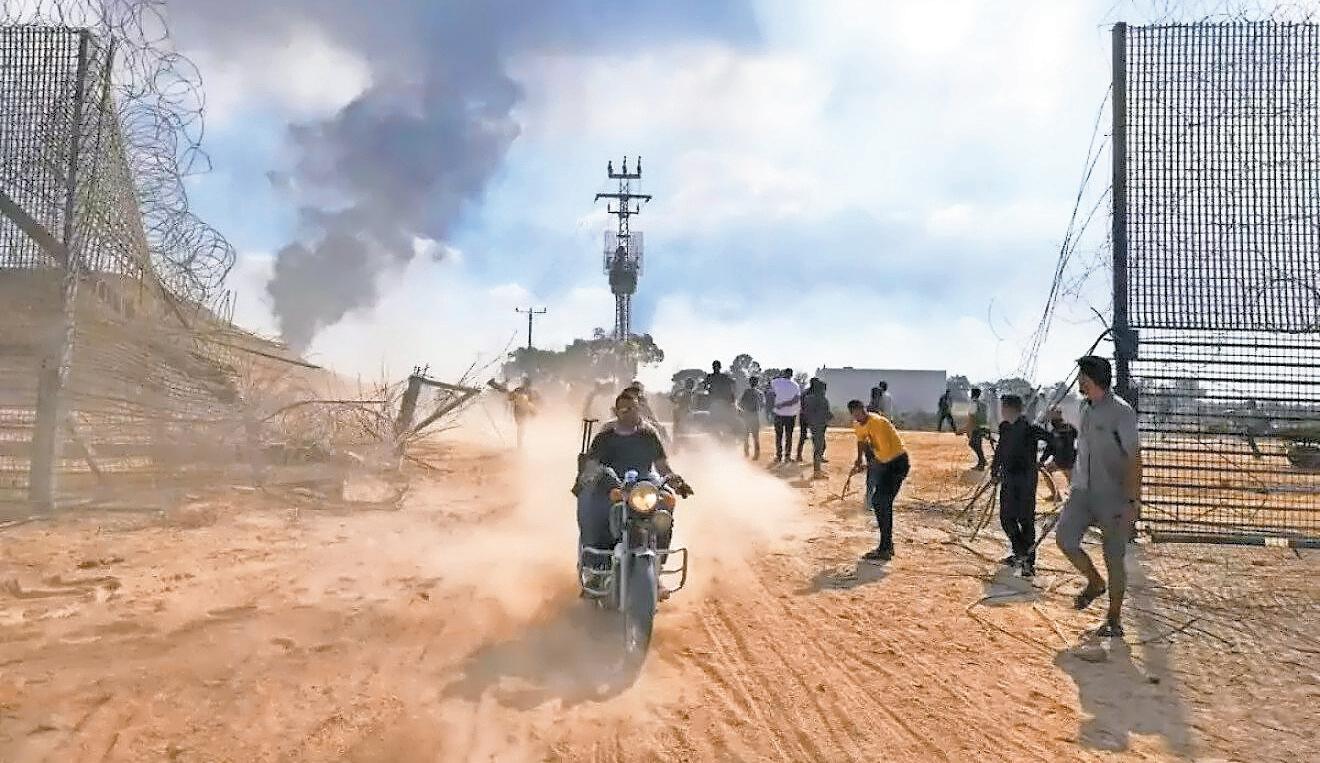
Operators had to answer mothers who could not reach missing fathers, desperate pleas for help tangled with reports of colleagues, firefighters and officers, who would never return.
Hazan recalled the shock of losing his own men: “Someone got a call from another center about one of our firefighters. At first, I said, ‘No way, I just saw him here at the station.’
“And then I realized it was true. Later I got word about another. Just the night before I had sent him to investigate a fire. He said, ‘No problem.’ By morning, I heard he’d been shot. How, G-d? How?
“I broke down at my parents’ house. They had never seen me like that. My friends were murdered, and I will never see them again,” Hazan lamented.
Amid the chaos, there were also the haunt-
ing calls from civilians: “I’ll never forget a call from a family in Kibbutz Be’eri or in Kibbutz Kfar Aza. They were screaming: ‘We’re burning, they set our house on fire!’ — and then the line went dead.
“And you know you’ll never reach them. I felt powerless. My job is to save lives, and in that moment, I realized there was nothing I could do.”
Nearly two years later, those memories still accompany Hazan and the young operators who came to work that morning expecting a routine shift, only to leave scarred in ways no one can see.
Capt. Keren Hiba Naim, commander of the national command-and-control center, recalled the moment she grasped the scale of the massacre:
“From the first barrage, at 6:30, we understood this was something different. A massive
rocket attack, across the country. We immediately reported up the chain of command, and within half an hour, the emergency protocols were activated.”
The operators, most of them just 21 to 27 years old, were forced to confront unthinkable dilemmas. A voice screamed down the line: “They’re shooting at me” — what do you say to that?
A family trapped in a burning house begged: “We’re holding the door shut, terrorists are outside. Can we let go? Can we stop holding?”
Wounded civilians were given instructions on how to apply a tourniquet, something never part of the hotline’s job.
Naim described the operators’ inner torment: “The DNA of an operator is to take a call and pass it on to field crews, and that’s where it ends.
“On Oct. 7, it was totally different. We couldn’t send out firetrucks. There was no response on the ground. The calls began and ended with us. Some lasted 40 minutes, 50 minutes, an hour and a half.
“The operators stayed on the line, sometimes trying to calm people, sometimes just staying silent with them until the very last moment, until the call was cut by gunfire, or until there was no breath left to hear.”
In retrospect, Fire and Rescue Commissioner Eyal Caspi said, “Today we are much better prepared, far more professional, more determined and fully aware of the immense responsibility on our shoulders.
“I am proud of the service. It is small, but as I always say, these are people with soul. People willing to give everything, even their lives, for the citizens of Israel.
“Our mission is to build the national resilience that will allow the security forces, the IDF and all agencies to prevail on the battlefield, and to ensure the swift return of all the hostages and missing persons to their families,” he said.

EThEl G. hofMAN

It started with a chance remark after a Shabbat dinner. “What a feast! You must have cooked for hours!”
I didn’t answer immediately. Working in my home office, I haven’t the time or the inclination to spend hours in the kitchen anymore. And neither do busy parents, young couples or working professionals. While everyone wants a traditional High Holiday meal, no one wants to spend a week shopping, chopping, boiling, baking and freezing dish after dish.
And these days, there’s really no need for it. Today, with literally thousands of kosher convenience-food items available in markets, it’s easy to create sensational meals with minimum effort. So while you can’t avoid the shopping, you can skip the other lengthy processes with just a bit of pre-planning and a dollop of shortcuts.
Also, the emphasis in contemporary kitchens is on healthier eating patterns. We include more fresh produce in our meals. We’re cooking fish and chicken, rather than red meat — the latter which takes much longer to cook (think of braising a brisket for three to four hours).
Instead of matzah-ball soup, serve a gazpacho, redolent with fresh shredded basil. Include wedges of crisp Bosc or Asian pear along with apples to dip in honey. Gussie up already-roasted chicken with your own marinade, and end the meal with an apple cobbler mixed, baked and served in one dish. Magic! To avoid taking out, setting up and washing china plates and crystal glassware, arrange attractive paper

goods and plastic ware on a tray and eat picnicstyle. (The kids will love it!)
And while wine should be available (Jewish holidays require it), many guests prefer nonalcoholic beverages in what will actually still be late summer as the Jewish calendar changes. Israelis use fresh herbs abundantly. Before filling a water pitcher, insert four to five stems of fresh mint. To top off the entire production, take a seedless watermelon, slice in wedges and arrange on a pretty platter. Or heap clementine oranges in a bowl with mint or rosemary sprigs tucked in. It’s a fresh, sweet and a perfect finale to a simple, yet sensational festive meal.
At that Shabbat dinner, I promised to share my “secrets” and recipes with my millennial
guests. In return for it, I challenged them to get together and make a Rosh Hashana dinner. The suggestion was met with downright alarm. Silence snuffed out all conversation. Thankfully — there’s one in every crowd — Cousin George’s face lit up. He turned to May, his wife, and said: “This could be fun.” And so it began … a wildly successful Rosh Hashana dinner to continue for the years ahead hosted by a new generation.
So don’t hold back. Check out these recipes. Make all for a complete Rosh Hashana dinner or bring just one of them to the host of the meal that you’ll be attending. You can also add a round challah, the tradition shape used for the Jewish New Year.
•No self-rising flour? Use 1 cup all-purpose flour, mixed with 1-1/2 tsp. baking powder and a pinch salt.
•Fresh herbs: Use any mixture in any quantity. Just trim the tough stems on parsley, mint, dill and basil. Use leaves and stems for best flavor. Depending on size, one bunch, loosely packed, is about 3 to 4 cups.
•Lemons should be at room temperature. When squeezed, these yield more juice than ones fresh from the fridge. There’s no substitute for the flavor of fresh lemon juice. Refrigerate in covered jar for use within 3 days. Or pour into ice-cube trays and freeze. Pop out a cube to use as needed.
•Cinnamon-sugar keeps well in a tightly covered container in a cool dry place. Mix 2 tablespoons sugar to 2 teaspoons cinnamon, and add a pinch of nutmeg (optional). Serve sprinkled on breakfast toast, over fresh fruit or on baked desserts.
•Some items, such as balsamic vinegar, garlic powder, canned tomatoes, canned chickpeas and pumpkin seeds, on the “what to buy” list are good additions to keep on hand. Nuts and seeds may be placed in plastic bags and frozen.
•Hosting a crowd? No shame in using paper and plastic. Paper plates are pretty and durable, and plastic knives and forks (especially the silver ones) look like the real thing. Flatware can be easily washed for later re-use. For a more for-

mal look, set the dinner table one or two days beforehand and cover loosely with a cloth. Or try trays (you can purchase disposable ones at a party store) and eat picnic-style.
•Don’t hesitate: Pick up pre-cooked roast or rotisserie chickens, then make it “your own” with a pomegranate sauce (recipe below). It saves time and labor — and you’re assured of perfectly cooked chicken.
•Choose pre-cut veggies and fruit from the market, canned tomatoes and anything that will make life easier. Remember, pre-cut produce, especially if it’s organic, should be refrigerated and used within 2 days.
•Items you may have on hand: flour, sugar, baking powder, bread, honey, olive oil, pareve margarine, cinnamon. — Ethel G. Hofman
• Round challah and wine
• Apple slices, pear slices and honey
• Autumn Gazpacho
• Drizzled Tricolor Cherry Tomatoes
• Israeli Blessing Salad
• Roasted Pomegranate Chicken
• Za’atar Salmon in a Pouch
• Moroccan Couscous with Currants and Carrots
• Oma’s Noodles and Blueberries
• Apple-and-Walnut Cobbler
• Watermelon Wedges or Clementine Oranges
Recipes serve 6 to 8. A shopping list for each dish is included.
A slice of multigrain bread gives this a gentle, nutty texture. If preferred, substitute challah.
Ingredients:
• 1 (14-1/2 oz) can diced tomatoes
• 1-1/2-2 cups bottled Bloody Mary mix*
• Juice of 1/2 lemon
• 1/2 cucumber, peeled and cut in chunks
• 1 medium tomato, cut into 6 chunks
• 1 slice multigrain bread, torn in chunks
• 2 tsp. honey
• Salt and fresh ground pepper to taste
• 1/4 cup basil leaves packed
Directions: Unpeeled cucumber slices for garnish (optional). In blender or food processor, place all ingredients except salt, pepper and basil. Whirl 15 to 20 seconds at high for a desired texture. Pour into a bowl. Season to taste with salt and pepper.
Shred the basil with scissors and stir in. Refrigerate overnight.
To serve: Pour into small glasses. Float 2 thin slices of cucumber on top (optional).
*May substitute 1-1/2 cups vegetable juice with 1/2 teaspoon each dried basil, dried oregano and fresh ground pepper stirred in.
To Buy: Bloody Mary mix or vegetable juice, lemon, tomato, cucumber, fresh basil
Double the dressing ingredients. Refrigerate extra to use later as salad dressing or to drizzle over cooked veggies.
Ingredients:
• 1/4 cup extra-virgin olive oil
• 3 Tbps. balsamic vinegar
• 1 Tbps. Dijon mustard
• 2 green onions, trimmed and thinly sliced
• 2 pints tricolor cherry tomatoes, halved
• 1 rib celery with leaves, thinly sliced
• 1 cup basil leaves, finely shredded
• kosher salt and fresh ground pepper
• 1/2 cup pumpkin seeds
Directions:
In a jar with a tight-fitting lid, shake oil, vinegar and mustard to combine. Set aside. Place the green onions, tomatoes, celery and basil in a large serving bowl. Pour mustard dressing over and toss lightly to mix. Season with salt and pepper. Scatter pumpkin seeds over top. Serve chilled. May make a
See Hofman on page 14











































































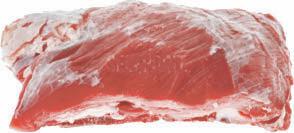









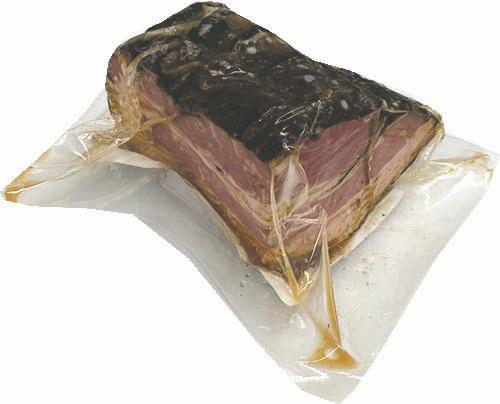



































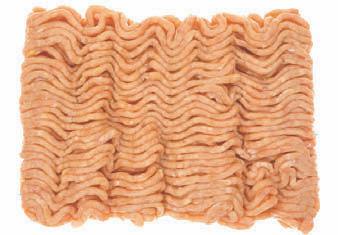











Continued from page 11
day ahead.
To Buy: balsamic vinegar, green onions, cherry tomatoes, celery, pumpkin seeds
Ingredients:
• 1 bunch parsley
• 1 bunch basil
• 1/2 bunch dill
• 1 (14-1/2 oz) can chickpeas, drained
• 1 cucumber, unpeeled and coarsely diced
• 3/4 cup dried cranberries
• 1/4 cup extra virgin olive oil
• 3 Tbps. fresh lemon juice
• 1 tsp. cumin
• Salt and fresh ground pepper to taste
Directions:
Trim parsley stems. Pull leaves off basil and discard stems. Dill may be used without trimming. Rinse well in cold water. Spin dry all herbs in salad spinner.
Place in food processor. Pulse to chop coarsely. Transfer to a large bowl. Add the chickpeas and remaining ingredients. Toss gently to mix. Serve at room temperature.
Note: May be made the day beforehand; cover and refrigerate.
To Buy: can chickpeas, parsley, basil, dill, cucumber, dried cranberries, cumin.
No one will guess this starts with roasted chicken from the market!
Ingredients:
• 1/2 cup pomegranate juice or juice from 1 large pomegranate
• 1/2 cup apricot preserves
• 2 Tbps. fresh lemon juice
• 1 Tbps. bottled grated ginger or 1 tsp. powdered
• 1/2 tsp. salt
• 1/2 tsp. fresh ground pepper
• 2 roasted chickens, quartered
• Pomegranate seeds for garnish (optional)
Directions:
Preheat oven to 350 degrees. Place pomegranate juice, apricot preserves, lemon juice, ginger, salt and pepper in small microwave bowl. Heat on “High” for 18 seconds, or until preserves are melted. Check after 10 seconds. Stir to mix. Cool slightly.
Arrange chicken in one layer in a baking dish. Pierce each piece 2 times with a fork. Pour the pomegranate mixture over top. Cover tightly with foil. Heat through in preheated oven 20 to 25 minutes. Chicken will steam and absorb flavors.
Serve garnished with pomegranate seeds (optional).
To Buy: pomegranate juice or pomegranate, apricot preserves, lemon, 2 roasted chickens, pomegranate seeds (optional).
Ingredients:
• 8 pieces aluminum foil, each 15×18 inches
• 16 thin asparagus spears, each cut in half
• 1 large sweet onion, cut in 8 slices
• 8 salmon fillets (6 to 8 oz. each)
• 1 Tbps. za’atar spice*
• 8 Tbps. peach-mango salsa**
• 8 sprigs dill
• 8 lemon wedges
Directions:
Spray aluminum foil with nonstick vegetable spray.
To assemble: On center of 1 sheet of foil, place 1 asparagus spear (2 pieces).
Top with a slice of onion, then a salmon fillet. Sprinkle lightly with za’atar. Drizzle a tablespoon of salsa over and then top with a sprig of dill.
Bring the long edges of foil up and over the salmon to meet at center. Fold over loosely to create a tight seal. Then fold edges at each side to seal. Place on a baking sheet. Repeat with remaining ingredients. May be refrigerated 4 to 6 hours before cooking.
Bake in a preheated 450-degree oven for 18 to 20 minutes, depending on thickness of salmon fillet. A 1-inch fillet will need closer to 20 minutes.
*A lively Middle Eastern spice blend of thyme, sesame and sumac. Also add to olive oil for dipping. It’s now available in many supermarkets.
**May substitute a tomato/vegetable salsa.
To Buy: 8 salmon fillets (6 to 8 ounces each), za’atar spice, large onion, 16 thin asparagus spears, peach mango salsa, dill.
Couscous is not a grain. It’s a pasta made from semolina flour, which is extremely high in gluten.
Ingredients:
• 2 pkg. (approximately 5.7 oz. each)
Near East couscous
• 1/2 cup currants
• 16-oz pkg. baby carrots, peeled
• 1/2 cup extra-virgin olive oil
• 1/4 cup fresh lemon juice
• 1/2 tsp. cumin or turmeric
• 1/2 tsp. salt
• 1/2 tsp. fresh ground pepper
• 1/2 cup finely snipped mint, divided
Directions:
Prepare couscous according to package direction. Stir in currants. Cover and set aside to keep warm.

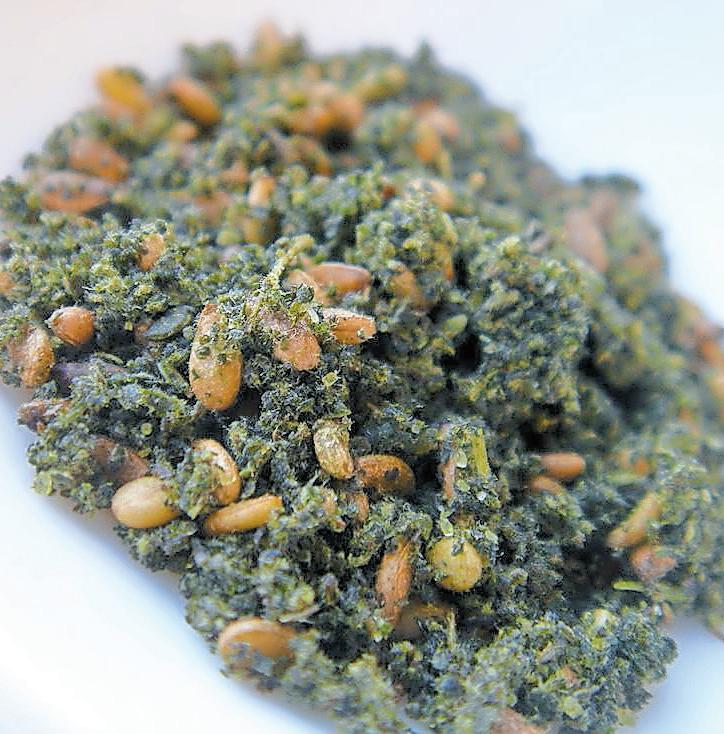
Whisk together the olive oil, lemon juice, cumin or turmeric, salt and pepper. Stir in 1/4 cup mint. Set aside.
In a large saucepan, cover carrots with boiling water. Bring to boil and cook for 10 minutes, or until fork-tender. Drain well. Transfer to a serving bowl.
Pour olive-oil mixture over and stir gently to mix. Spoon the carrots over the couscous. Sprinkle remaining mint over top to garnish. Serve warm.
*May be prepared a few hours ahead of time. Cover loosely with plastic wrap. Reheat in microwave for 2 to 3 minutes, or until warm. Sprinkle mint over top just before serving.
To Buy: 2 packages couscous, currants, peeled baby carrots, mint.
From my late husband’s grandmother’s kitchen. She used fresh blueberries, but in September, I use frozen or little blue Italian plums, stones removed and quartered.
Ingredients:
• 1 pkg. (12 oz.) medium egg noodles
• 1/3 cup sugar
• 2 Tbps. fresh lemon juice

• 3 cups blueberries
• 2 Tbps. margarine
• 2 Tbps. cinnamon-sugar
Directions:
In a large saucepan of boiling water, cook noodles until tender but still firm (5 to 7 minutes). Drain in a colander.
Meanwhile, in a medium saucepan, stir together the sugar, lemon juice, blueberries and 3 tablespoons water.
Stir over medium heat to dissolve sugar and bring to a boil, about 5 minutes.
In a large serving bowl, toss the noodles with the margarine and cinnamon-sugar. Pour the blueberry mixture over top and serve hot.
Note: Blueberry sauce may be made ahead of time and heated when needed.
To buy: noodles, blueberries.
Prepare, bake and serve in a single dish. No bowls to wash
Ingredients:
• 6 medium apples
• 1 stick (4 oz.) margarine, cut in 4 pieces
• 1 cup self-rising flour
• 1 cup sugar
• 1/2 cup nondairy creamer
• 1/2 cup cold water
• 3/4 tsp. orange extract
• 10 to 12 walnut halves
• 1 to 2 Tbps. honey to drizzle
Directions:
Preheat oven to 350 degrees. Core and quarter apples. Do not peel. Cut into wedges about one-quarter-inch thick. Set aside.
In an 11x7 ovenproof dish, place margarine. Set in microwave to melt, 30 to 40 seconds, depending on microwave wattage. To the melted margarine add flour, sugar, nondairy creamer, water and orange extract. Stir to blend.
Scatter apple wedges and walnuts over top, making sure to cover the batter. Do not stir. Drizzle with honey. Bake in preheated oven 45 to 50 minutes, or until nicely browned and bubbly at edges. Serve warm or at room temperature. To Buy: apples, nondairy creamer, walnut halves.
Write: Columnist@TheJewishStar.com

Jewish Star Torah columnists: Rabbi Benny Berlin, spiritual leader of BACH Jewish Center in Long Beach; Rabbi Avi Billet of Anshei Chesed, Boynton Beach, FL, mohel and Five Towns native; Rabbi Binny Freedman, rosh yeshiva of Orayta, Jerusalem; Dr. Alan A. Mazurek, former ZOA chair, retired neurologist, living in Great Neck, Jerusalem and Florida.
Contributing writers: Rabbi Sir Jonathan Sacks zt”l, former chief rabbi of United Hebrew Congregations of British Commonwealth; Rabbi Yossy Goldman, president South African Rabbinical Association; Rabbi Dr. Tzvi Hersh Weinreb, OU executive VP emeritus.
To submit commentary, inquire at: Editor@TheJewishStar.com. Contact our columnists at: Columnist@TheJewishStar.com.
Fri Sept 5 / 12 Elul
Ki Seitzei
Five Towns candles: 7:03 • Havdalah: 8:10
Scarsdale candles: 7:03 • Havdalah: 8:02
Fri Sept 12 / 19 Elul
Ki Savo
Five Towns candles: 6:51 • Havdalah: 7:58
Scarsdale candles: 6:51 • Havdalah: 7:50
Fri Sept 19 / 26 Elul
Nitzavim
Five Towns candles: 6:39 • Havdalah: 7:46
Scarsdale candles: 6:39 • Havdalah: 7:37
Mon Sept 22 / 29 Elul
Erev Rosh Hashana
Five Towns candles: 6:34
Scarsdale candles: 6:34
Five Towns Candlelighting: From the White Shul, Far Rockaway, NY
Scarsdale Candlelighting: From the Young Israel of Scarsdale, Scarsdale, NY
rabbi Sir JonaThan SaCkS zt”l

There is a verse in Ki Seitzei that is momentous in its implications. It is easy to miss, appearing as it does in the midst of a series of miscellaneous laws about inheritance, rebellious sons, overladen oxen, marriage violations and escaping slaves. Without any special emphasis or preamble, Moses delivers a command so counterintuitive that we must read it twice to make sure we have heard it correctly:
Do not hate an Edomite, because he is your brother. Do not hate an Egyptian, because you were a stranger in his land. Deut. 23:8
What does this mean in its biblical context?
The Egyptians of Moses’ day had enslaved the Israelites, “embittered their lives,” subjected them to a ruthless regime of hard labor and forced them to eat the bread of affliction. They had embarked on a program of attempted genocide, Pharaoh commanding his people to throw “every male [Israelite] child born, into the river” (Ex. 1:22).
Now, 40 years later, Moses speaks as if none of this had happened, as if the Israelites owed the Egyptians a debt of gratitude for their hospitality.
Yet he and the people were where they were only because they were escaping from Egyptian persecution. Nor did he want the people to forget it. To the contrary, he told them to recite the story of the Exodus every year, as we still do on Passover, re-enacting it with bitter herbs and unleavened bread so that the memory would be passed on to all future generations.
If you want to preserve freedom, he implies, never forget what it feels like to lose it. Yet here, on the banks of the Jordan, addressing the next generation, he tells the people, “Do not hate an Egyptian.” What is going on in this verse?
What Moses is saying is this: To be free, you have to let go of hate
If they continued to hate their enemies, Moses would have taken the Israelites out of Egypt but he would not have taken Egypt out of the Israelites. Mentally, they would still be there, slaves to the past. They would still be in chains,
If you want to preserve freedom, never forget what it feels like to lose it.
not of metal but of the mind — and chains of the mind are the most constricting of all.
You cannot create a free society on the basis of hate
Resentment, rage, humiliation, a sense of injustice, the desire to restore honor by inflicting injury on your former persecutors — these are conditions of a profound lack of freedom. You must live with the past, implies Moses, but not in the past. Those who are held captive by anger against their former persecutors are captive still. Those who let their enemies define who they are, have not yet achieved liberty.
The Mosaic books refer time and again to the Exodus and the imperative of memory — “you shall remember that you were slaves in Egypt.”
Yet never is this invoked as a reason for hatred, retaliation or revenge. Always it appears as part of the logic of the just and compassionate society the Israelites are commanded to create: the alternative order, the antithesis of Egypt.
The implicit message is: Limit slavery, at least as far as your own people is concerned.
Don’t subject them to hard labor. Give them rest and freedom every seventh day. Release them every seventh year. Recognize them as like you, not ontologically inferior. No one is born to be a slave.
Give generously to the poor. Let them eat from the leftovers of the harvest. Leave them a corner of the field. Share your blessings with others. Don’t deprive people of their livelihood. The entire structure of biblical law is rooted in the experience of slavery in Egypt, as if to say: you know in your heart what it feels like to be the victim of persecution, therefore do not persecute others.
Biblical ethics is based on repeated acts of role-reversal, using memory as a moral force. In the books of Shemot and Devarim, we are commanded to use memory not to preserve hate but to conquer it by recalling what it feels like to be its victim. “Remember” — not to live in the past but to prevent a repetition of the past.
Only thus can we understand an otherwise inexplicable detail in the Exodus story itself. In Moses’ first encounter with G-d at the Burning Bush, he is charged with the mission of bringing the people out to freedom. G-d adds a strange rider: I will make the Egyptians favourably disposed toward this people, so that when you leave you will not go empty-handed. Every woman is to ask her neighbour and any woman living in her house for articles of silver and gold and for clothing, which you will put on your sons and daughters. Ex. 3:21-22
The point is twice repeated in later chapters (Ex. 12:35). Yet it runs utterly against the grain of biblical narrative. From Genesis (14:23) to the book of Esther (9:10, Est. 9:15, Est. 9:16) taking booty, spoil, plunder from en-

emies is frowned on. In the case of idolaters, it is strictly forbidden: their property is cherem, taboo, to be destroyed, not possessed (Deut. 7:25; Deut. 13:16).
When, in the days of Joshua, Achan took spoil from the ruins of Jericho, the whole nation was punished. Besides which, what happened to the gold? The Israelites eventually used it to make the Golden Calf. Why then was it important — commanded — that on this one occasion the Israelites should ask for gifts from the Egyptians? The Torah itself provides the answer in a later law of Deuteronomy about the release of slaves: If a fellow Hebrew, a man or a woman, sells himself to you and serves you six years, in the seventh year you must let him go free. When you release him, do not send him away empty-handed. Supply him liberally from your flock, your threshing floor and your winepress. Give to him as the L-rd your G-d has blessed you. Remember that you were slaves in Egypt and the L-rd your G-d redeemed you. That is why I give you this command today. Deut. 15:12-15
Slavery needs “narrative closure.” To acquire freedom, a slave must be able to leave behind feelings of antagonism to his former master. He must not depart laden with a sense of grievance or anger, humiliation or slight. Were he to do so, he would have been released but not liberated. Physically free, mentally he would still be a slave.
The insistence on parting gifts represents the Bible’s psychological insight into the lingering injury of servitude. There must be an act of generosity on the part of the master if the slave is to leave without ill-will. Slavery leaves a scar on the soul that must be healed.
When G-d told Moses to tell the Israelites to take parting gifts from the Egyptians, it is as if He were saying: Yes, the Egyptians enslaved you, but that is about to become the past. Precisely because I want you to remember the past, it is essential that you do so without hate or desire for
revenge. What you are to recall is the pain of being a slave, not the anger you feel towards your slave-masters. There must be an act of symbolic closure. This cannot be justice in the fullest sense of the word: such justice is a chimera, and the desire for it insatiable and self-destructive. There is no way of restoring the dead to life, or of recovering the lost years of liberty denied. But neither can a people deny the past, deleting it from the database of memory. If they try to do so it will eventually come back — Freud’s “return of the repressed” — and claim a terrible price in the form of high-minded, altruistic vengeance. Therefore the former slave-owner must give the former slave a gift, acknowledging him as a free human being who has contributed, albeit without choice, to his welfare.
This is not a squaring of accounts. It is, rather, a minimal form of restitution, of what today is called “restorative justice.”
Hatred and liberty cannot coexist. A free people does not hate its former enemies; if it does, it is not yet ready for freedom. To create a nonpersecuting society out of people who have been persecuted, you have to break the chains of the past; rob memory of its sting; sublimate pain into constructive energy and the determination to build a different future.
Freedom involves the abandonment of hate, because hate is the abdication of freedom. It is the projection of our conflicts onto an external force whom we can then blame, but only at the cost of denying responsibility.
That was Moses’ message to those who were about to enter the Promised Land: that a free society can be built only by people who accept the responsibility of freedom, subjects who refuse to see themselves as objects, people who define themselves by love of G-d, not hatred of the other.
“Do not hate an Egyptian, because you were strangers in his land,” said Moses, meaning: To be free, you have to let go of hate.
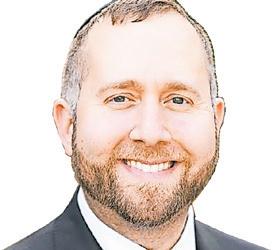
Ihave been waking up early, before my children are up, to work on sermons. The High Holidays are coming, and as a rabbi, this is the season of intensity.
One morning, in the quiet hours before sunrise, I was staring at the blank Word document demanding my attention. Suddenly, I heard the familiar scampering of little feet. My son was running to say hello, his toothless grin lighting up the
room as he eagerly shared his plans for the day. In that moment, I felt pulled in two directions. On one side was the sermon, the responsibility of preparing for Rosh Hashana. On the other side was my son, a moment of connection.
It brought to mind a commandment in this week’s parsha, Ki Teitzei. The Torah tells us: “If you see your brother’s lost object … you shall certainly return it to him” (Devarim 22:1). A simple mitzvah of responsibility. Yet the Torah does not stop there. It adds another layer: “Lo suchal lehis’aleim, you cannot ignore it.”
This phrase is striking. Lehis’aleim is reflexive. It does not merely mean ignoring what others see. It means convincing yourself you never saw it at all. It is the little voice inside that whispers, “I
did not notice. I cannot deal with this right now.
I am too busy.”
How often do we do this? We catch a glimpse of someone struggling. We sense a friend who looks lonely. We hear of an organization in need, or a cause that tugs at our heart. For a brief moment it pierces us, but then we quickly bury it, even from our own conscience. We move on as though the thought had never entered our mind.
The Torah confronts that instinct head-on. Lo
suchal lehis’aleim means you cannot make yourself blind. You cannot pretend not to see. You cannot bury the truth of what your eyes and heart already know. The Torah demands that we stop. It asks us to redirect the trajectory of our day to make space to do what is right. So the question becomes: how do we train ourselves not to look away? The answer is not found in grand gestures or dramatic sacrifices. It begins with the smallest of acts. We notice a jacket left behind in shul and return it to its owner. We check in on a neighbor who has not been seen in a while. We respond to a community need even when it arrives at an inconvenient time. Each small choice rewires us. Each act of
‘Mend my broken heart and let me live again’

To readers who remember the Bee Gees, our headline may bring memories of a plaintive 1970s hit love song. But today, the words, “broken heart” evoke other, more poignant and piercing emotional reactions. And since everything in our universe is contained in our Holy Torah, let us start there.
This week’s parsha, Ki Seitzei, is under-
standably associated with war, beginning with the unusual and vexing issue of a beautiful woman taken by a Jewish soldier in the heat of battle. This is followed immediately by the passage dealing with the beloved wife and hated wife and finally the rebellious son. It is understood by most commentators that the juxtaposition of these three passages is a progression — the inappropriate desire for the non-Jewish woman captive will lead to her being despised, which will ultimately lead her son to become an incorrigible and rebellious child.
I’d like to focus on the second of the three passages: the two wives, beloved and despised.

Who coined the slogan, “Never again”? Apparently, it goes back to a 1927 poem about Masada, “Never again shall Masada fall.” It was later used by liberated Jewish prisoners of the Buchenwald death camp. Then, in the late 1960s, it became much more popular with the founding of the Jewish Defense League (JDL) and its use as the title of a book by its controversial founder, Rabbi Meir Kahane, in 1971.
One could argue, however, that it goes back to the very beginnings of Jewish history. This week’s Torah reading in Ki Seitzei ends with the commandment “Zachor! (Remember!)”
“Remember what Amalek did to you on your journey out of Egypt; how they surprised you on the road and struck those at the rear … when you were faint and weary. … Erase any memory of Amalek and never forget!”
We are commanded to forever remember how the warrior nation Amalek attacked us for no reason whatsoever. We were minding our own business, we weren’t threatening the Amalekites or their territory, and they ambushed us in a completely unprovoked attack.
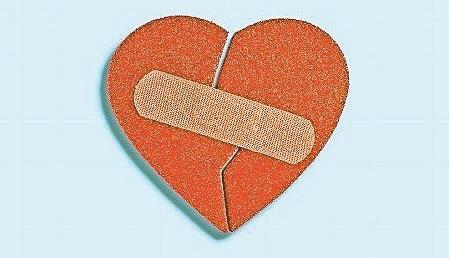
It is interesting to note that the Or HaChaim Hakadosh, Rabbi Chaim Ibn Attar, comments that the reference to the first born son as the hated one (Deuteronomy 21:15) indicates a declaration by the Torah
that the bechor, the first born, will be born to the hated wife. This he says, is an indication of Hashem’s compassion, for seeing the heartbreaking situation of the hated wife, Hashem will grant her the honor and the reward of having the first born (who will inherit a double portion) son.
Much as the matriarch Leah was rewarded with children first, before her sister Rachel, because Leah was unloved by Jacob, and Hashem felt her pain.
This notion, that Hashem supports the broken hearted is seen repeatedly throughout Tanach: Tehillim say that “Hashem is close to the
‘Never again’ goes all the way back to Amalek Yes,
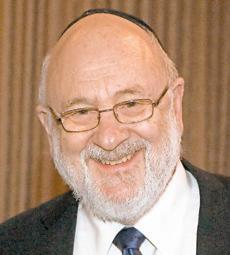
For many of us, the first pieces of wisdom we learned were from nursery rhymes and schoolyard jingles. Sometimes these childish lessons had value, but more often they were off the mark and had the effect of distorting a truer perspective on life.
Take, for example, this ditty: “Sticks and stones may break my bones, but words can never harm me.” The implicit message, which had some utility on the playground, is that we can
safely ignore insults to our emotions and feelings, and need to only be concerned about physical injury. The truth, however, is quite different. Obviously, we want to protect ourselves from physical harm. The trauma of bodily injury is something which none of us wishes to bear. But we cannot minimize the harmful effects of psychological trauma, whether it comes in the form of insults, embarrassment, or shame.
During the years I spent as a psychotherapist, I dealt with quite a few victims of domes-

tic violence. I saw the effects that abuse could have upon people, but I noticed that those who suffered emotional abuse were less amenable to successful treatment than those who were physically battered.
Let’s face it. Words hurt.
The power that words have to do damage is something which is recognized by our Torah. That emotions can be grievously wounded, reputations ruined, and relationships damaged beyond repair through “mere words,” is illustrated in biblical narratives, Talmudic tales, and Hassidic stories.
In this week’s parsha, Ki Seitzei, we are instructed to “remember what the L-rd your G-d did unto Miriam, on the road out of Egypt.” The Torah is referring to the fact that Miriam was punished by a leprous infection.
The full episode of Miriam’s sin and its consequences appears in an earlier portion of the Torah, at the very end of Parshat Beha’alotecha (Bamidbar12:1-16). There we learn that Miriam and Aaron spoke against Moses because of his Cushite wife. They went on to belittle Moses’ importance, and spoke condescendingly about him.
It seems from the context of the story that Miriam, as the instigator of this critique, did so privately. Nevertheless, the Almighty was angry with her and she was healed, ironically, only because of Moses’ prayerful intervention. Thus, our sages understand this command to remember Miriam as an injunction against speaking lashon hara, malicious gossip.
Editor & Publisher: Ed Weintrob
516-622-7461 ext 291
Jewish Star Associate: Nechama Bluth
516-622-7461 ext 241
Content: The Publisher endeavors to ensure that our content is within the bounds of normative halachah and hashkafah. Anyone who feels anything we publish may be inappropriate in this regard is urged to bring the item in question to the attention of the Publisher.
Advertising is accepted at the sole discretion of the Publisher and should conform to standards appropriate for distribution in an Orthodox community. Send us your news! Editor@TheJewishStar.com
Advertising: Publisher@TheJewishStar.com
Kashrut: The Jewish Star is not responsible for the
kashrut of any product or establishment featured in its pages. If you have questions regarding any establishment or product, including its supervision, please consult your rabbi for guidance.
Submissions: All submissions become the property of The Jewish Star and may be edited and used by the Publisher, its licensees and affiliates, in print, on the web and/or in any media that now exists or will exist in the future in any form, including derivative works, throughout the world in perpetuity, without additional authorization or compensation. The individual or entity submitting material affirms that it holds the copyright or otherwise has the right to authorize its use in accordance with The Jewish Star’s terms for submissions.
Opinions: Views expressed by columnists and other writers do not necessarily reflect the position of the Publisher or of The Jewish Star LLC.
Distribution: The Jewish Star is available free in kosher food establishments, stores, synagogues, and curb-side newsboxes on Long Island, in New York City and elsewhere. To request free delivery to your location, write Publisher@TheJewishStar.com.
Copyright: All content is copyright and may not be republished or otherwise reproduced without written permission by The Jewish Star; to do so without permission is against the law and halacha. For content reproduction write to Publisher@TheJewishStar.com.
The Jewish Star subscribes to JNS. It, or its contributors, own the copyrights on material attributed to them. The length and content of JNS material and all other submitted material may be edited by The Jewish Star. Member: American Jewish Press Association. This newspaper contains words of Torah. While it is not considered shaimos, please dispose properly.
Mitchell Bard, foreign policy analyst, authority on USIsreal relations; Ben Cohen, senior analyst, Foundation for Defense of Democracies; Stephen Flatow, president, Religious Zionists of America-Mizrachi and father of Alisa Flatow, murdered in an Iranian-sponsored Palestinian terrorist attack in 1995; Yisrael Medad, Americanborn Israeli journalist and political commentator; Rafael Medoff, founding director of David S. Wyman Institute for Holocaust Studies; Fiamma Nirenstein, Italian-Israeli journalist, author of 13 books, leading voice on Israeli affairs, Middle Eastern politics and antisemitism; Melanie Phillips, British journalist; Moshe Phillips, national chairman, Americans for a Safe Israel; Thane Rosenbaum, Distinguished University Professor at Touro University (published by Jewish Journal); Jonathan S. Tobin, editor-in-chief, Jewish News Syndicate.

By the end of the second academic year since the Hamas-led Palestinian Arab attack against southern Israeli communities on Oct. 7, 2023, the unprecedented increase in antisemitism on American college campuses appeared to have abated. The steam seemed to have gone out of the organized mobs of proHamas demonstrators who took part in encampments and building takeovers while chanting for the destruction of Israel and Jewish genocide (“From the river to the sea”) and for terrorism against Jews wherever they lived (“Globalize the intifada”).
More importantly, the administrators who tolerated and encouraged the abuse of Jews — something they never would have stood for had the victims been any other minority group — had met a force they feared just as much, if not more, than truculent leftist faculty members and students.
President Donald Trump came into the picture with an aggressive and ambitious plan to make campuses safe for Jewish students and roll back factors that had made the post-Oct. 7 surge of antisemitism possible.
By the time this past spring semester had ended, the second-term president’s effective threats of defunding those institutions that had tolerated and encouraged Jew-hatred had forced many schools to shut down the wave of illegal activity.
Still, as students return to campus for the fall semester, complacency about the problem would be a mistake. If anything, the coming months could turn out to be even more problematic for Jewish students as two equally powerful forces collide: the anti-Israel and antisemitic fervor that is the result of the war in Gaza eclipsing every other left-wing cause in importance, and

the determination of Trump to end the reign of woke leftism in academia.
In recent months, as the campuses quieted down for the summer, the drumbeat of incitement against Israel, Zionism and Jews has increased rather than died down. Hamas propaganda about Israel committing “genocide” in Gaza and deliberately starving Palestinians in the Strip has been mainstreamed by corporate media outlets and made headlines worldwide.
These blood libels have become part of the conventional wisdom about the Middle East among liberal and left-wing elites in journalism, academia, cultural establishments and unions. That has caused many Jews who fear being out of sync with liberal fashion to engage in unfair criticism of Israel, which essentially legitimizes anti-Zionist invective and the cause of letting the Hamas monsters behind the unspeakable atrocities survive the war they started on Oct. 7.
Most schools now understand that Trump means business and that he fully intends to punish academic institutions that let Jew-hatred flourish with defunding measures that will devastate their budgets. While most of them are
far from ready to comply with the full range of demands, none want their campuses to become the focus of administration or congressional inquiries, let alone wake up and discover that Washington is pulling the money that represents the lifeblood for even the richest of universities.
That means they will, as many were in the spring, be ready to suspend and expel students who engage in campus takeovers. Nevertheless, the forces behind the pro-Hamas mobs are just as determined to exploit the successes in the information wage that the terrorists, their funders and enablers in the media have won.
So, as American higher education reopens for business, it’s far from clear which of these two immovable forces will prevail. The one thing we do know is that the stakes in this battle of wills between liberal educational bureaucrats and the Republican administration are not merely a matter of political advantage for Trump or his opponents.
Those at risk if the administration’s defunding threats and justified demands for reforms to abolish the root causes of campus antisemitism are ignored or fail to have the intended effect will not be Trump’s appointees.
It is Jewish students who will suffer if administrators believe that they are better off appeasing leftist antisemites instead of the president. Their ability to move about their schools without fear of intimidation and even violence, as well as
to engage in academic life without having to disavow their people, their faith and Israel, hinges on whether the administration makes it clear that the consequences of another antisemitic surge will prove serious.
The forces behind the pro-Hamas agitation on campus have not been eliminated by Trump. The same factors that had ignited the firestorm of Jew-hatred throughout many of the country’s institutions of higher learning remain in place.
The administration’s campaign to deal with campus antisemitism came down like a ton of bricks on elite institutions like Columbia and Harvard. The president’s task force dealing with the subject demanded that they not only take stringent measures to curb the activities of the pro-Hamas mobs but also address the inherent factors that had made them possible.
Trump’s ambitious goal was not only to make schools safer for Jewish students but to roll back the hold of leftist doctrines that made the postOct. 7 troubles inevitable. While a turning point may have been reached in which these forces will now start to decline, these institutions have not been converted from woke strongholds to their previous position as defenders of the Western canon, the neo-Marxists have warred against.
The reign of bureaucrats implementing the woke catechism of diversity, equity and inclusion (DEI) that sought to exacerbate racial divisions, as well as falsely labeling Jews as “white” oppressors, is largely still there. So, too, are the overwhelmingly leftist faculties and administrators who have been thoroughly indoctrinated in the toxic myths of critical race theory, intersectionality and settler-colonialism.
The progressive takeover of academia has been slowly unfolding as the left has completed its long march through American educational institutions for decades. It reached its high point during the moral panic of the Black Lives Matter summer of 2020, following the killing that spring of George Floyd by a Minneapolis police officer. But as interest in dividing all Americans along immutable racial lines waned, the neoMarxist ideas that animated this movement are held up as a new orthodoxy throughout the humanities and among educational bureaucrats. Woke policies didn’t just predispose people to dislike Israel. They influenced the curricula taught at schools, as well as the hiring of teach-

Australian Prime Minister Anthony Albanese probably didn’t imagine that one week after his interior ministry abruptly canceled a visa for Simcha Rothman, a member of Israel’s Knesset, his government would be enveloped in a major dispute with Israel’s arch-foe, the regime in Iran.
Unlike Iran, Israel has not carried out any terrorist attacks in Australia. It has not encouraged hate crimes against that country’s growing Muslim population. It is not boycotting goods produced in Australia. Had Rothman been permitted to go ahead with his visit, organized by a local Jewish organization, he would not have advocated for any of these measures. Yet the letter revoking his visa asserted that his presence amounted to “a risk to the good order of the Australian community or a segment of the Australian community, namely the Islamic community.”
Commenting on the visa revocation, Home Affairs Minister Tony Burke insinuated that Rothman’s arrival might provoke civil unrest. “If you are coming to Australia to spread a message of hate and division, we don’t want you here,” he declared. “Australia will be a country where everyone can be safe and feel safe.”
Everyone, that is, except the Jewish commu-
Unlike Iran, Israel has not carried out terrorist attacks in Australia.
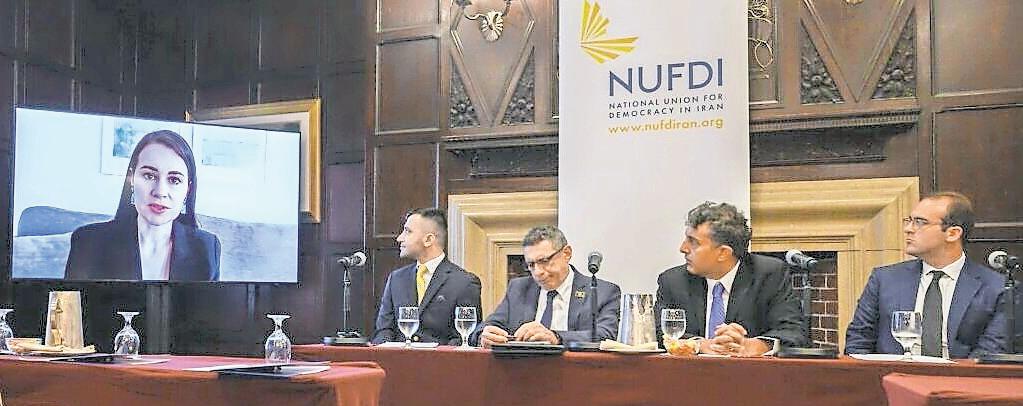
nity. Australian Jews, who represent 0.5 percent of the total population, have endured a miserable two years of arson, violent attacks and constant antisemitic abuse. In the 12 months that followed the Hamas pogrom of Oct. 7, 2023, hate crimes against Jews increased by an almost unfathomable 316% from the previous year. What’s now painfully and frustratingly clear is that while Australia has no shortage of homegrown and immigrant antisemites, the field is also open to a malicious foreign power like Iran.
If any foreign state is spreading hate and division in Australia, it’s Iran. But Albanese, Foreign Minister Penny Wong and the rest of Australia’s left-wing cabinet were too incensed with Israel to realize that until the country’s
intelligence service, assisted by information provided by the Israelis, produced irrefutable evidence of Iranian involvement in at least two of the antisemitic attacks: arson directed at a kosher delicatessen in Sydney in October 2024 and the firebombing of the Adass Israel synagogue in Melbourne two months later.
As a result, Albanese had little choice but to expel the Iranian ambassador and announce that the Tehran regime’s Islamic Revolutionary Guard Corps (IRGC) would be sanctioned, which is a move that should have been undertaken a long time ago.
Tehran’s plans to target Australian Jews were hatched long before the Oct. 7 atrocities. Writing in the Melbourne newspaper The Age,

Sanaa, Yemen, was the target of major Israeli airstrikes last week — an operation cloaked in secrecy but widely believed to have struck the upper echelons of Iran’s jihadist proxy war machine. On Thursday, an Israeli airstrike reportedly killed the Houthi defense minister, Mohamed al-Atifi, and chief of staff, Muhammad Abd al-Karim al-Ghamari.
The Israeli action came after days of relentless Houthi missile barrages from Yemen — another front in a war Israel never asked for but must now fight, for its survival. On Wednesday, Israelis rushed into bomb shelters — twice in just 10 days — as long-range rockets fired from impoverished, war-torn Yemen rained down in Tehran’s direction.
Seven active fronts now threaten the Jewish state: Gaza, Lebanon, Syria, Yemen, Judea and Samaria, Iran and the global battlefield of antisemitism. Israel must simultaneously rescue hostages, defeat Hamas, protect its civilians and withstand international condemnation.
Israel is attempting what no army has ever done: defeat a genocidal enemy that hides behind civilians, while continuing to deliver humanitarian aid to those same civilians, all under the glare of a hostile international press. More than 20,000 Hamas and allied fighters remain entrenched in tunnels, firing rockets from beneath schools, hospitals, and mosques. The IDF has gone to unprecedented lengths to minimize civilian casualties, but for Hamas, every dead Gazan is a propaganda victory.
Meanwhile, the global jihadist movement
is emboldened and flush with cash. Antisemitic demonstrations spread across Europe and America, echoing Hamas’s talking points almost word for word.
In Washington, President Donald Trump met with Ron Dermer, Jared Kushner and Middle East envoy Steve Witkoff to chart Gaza’s postwar future. One certainty emerged: Hamas will play no role in it. The international community must now choose whether to help build something sustainable — or reward terror once again.
On Israel’s northern border, a strike on Syrian forces prevented the destruction of a critical observation post. Talks are even underway with Abu Mohammad al-Julani, leader of the former al-Nusra Front, that could lead to mutual recognition by September.
In Lebanon, the government courageously voted to disarm Hezbollah, though the terror group — acting on Iranian orders — has so far refused. Still, Palestinian factions in Lebanon have already surrendered their arms, showing that pressure can work.
Iran, meanwhile, is cornered. It continues to enrich uranium to 60% in defiance of the IAEA and refuses inspections. Britain, Germany and France are threatening to reimpose “snapback” sanctions. Israel is watching closely, knowing the ayatollahs will exploit every Shi’ite proxy they can find, from the Houthis to Hezbollah, to extend their reach.
But while Israel fights for survival, Europe adds fuel to the fire. France is spearheading a September push at the United Nations to recognize a Palestinian state. Israeli Prime Minister Benjamin Netanyahu rightly accused President Emmanuel Macron of fueling antisemitism in France. Foreign Minister Gideon Sa’ar put it more bluntly: “If a terrorist organization embraces you, you’re
Australian political scientist Kylie MooreGilbert, who was incarcerated in Iran’s notorious Evin prison from 2018 to 2020 on fabricated charges of espionage, recalled an interrogation session during which her inquisitor pulled out a piece of paper listing the names and addresses of synagogues and Jewish organizations in her native Melbourne.
“He wanted to know if I’d visited any of them, and if so, what was inside,” she wrote. “By this time, I had no interest in co-operating with my captors, who had sentenced me to 10 years in prison on ludicrous charges of espionage and were attempting to blackmail me into working for them. I told them where they could shove

in the wrong place.”
Recognition without reform is not statehood; it is a reward for Hamas, and a betrayal of every hostage still in captivity.
Israel is also taking moral leadership where others have failed. This week, Netanyahu formally recognized the Armenian genocide, the Shoah of the Armenian people. For decades, Israel hoped to maintain warm relations with Turkey, once imagined as a bridge between Islam and the West.
But Turkish President Recep Tayyip Erdoğan has chosen instead to style himself an Ottoman sultan, demonizing Jews, calling Netanyahu “Hitler,” and building his influence on antisemitic hatred. His persecution of the Kurds only underscores his brutality.
By recognizing the Armenian genocide — at a moment when Armenia and Azerbaijan have finally made peace under Trump’s mediation — Israel has made peace with historical truth. That is no small achievement.
Israel today is under fire from seven directions. It faces Iran’s nuclear program, Hamas’s tunnels, Hezbollah’s rockets, and Europe’s hypocrisy. But it also demonstrates resilience, clarity and moral leadership. Where others equivocate, Israel names evil for what it is — and acts.
The world should take note. Rewarding terror only guarantees more war. Standing with Israel, by contrast, is the only path to peace.
Write: Columnist@TheJewishStar.com
HadI MaHdeYaN Yale student
The excitement I once felt arriving at Yale University from Tehran in 2023 for my studies quickly turned into concerns about my safety as an anti-regime Iranian.
At school, I witnessed the unchallenged authority of Islamic Republic sympathizers in American universities. Faculty tied to the regime have long presented themselves as presumptive Iranian voices, normalizing the regime’s illegitimate rule by erasing the realities of Iranians living in Iran.
Yale’s fall 2025 course catalogue, for instance, features a class by now-disgraced US diplomat Robert Malley, who led negotiations for the 2015 Joint Comprehensive Plan of Action (JCPOA), also known as the Iran nuclear deal, under former President Barack Obama.
Malley’s class will “examine the past in order to better appreciate the two governments’ worldviews” and place students “in the shoes of US and Iranian decision-makers.”
Course assignments for “Adversaries by Design: Deconstructing the Iran-US Relationship” have students cosplaying as diplomats for the regime, as if this is some benign Model UN-like exercise rather than a calculated attempt to humanize the theocratic, colonizing dictatorship
The Iranian regime’s main ‘soft power’ is manipulating the world’s ignorance.
responsible for the majority of crimes against humanity in the region since 1979.
The course revolves around defending Malley’s failed magnum opus, the JCPOA, and his syllabus mentions having guest lecturers such as Ali Vaez, Hossein Mousavian and Mohammad Javad Zarif, all of whom have acted on behalf of the regime at one time or another. Malley purports to offer “Iranian perspectives,” but the class will likely only feature Islamic Republic officials and supporters.
One might wonder how it’s possible for a former US government official who lost his security clearance and had close contact with Islamic Republic agents to lecture at an elite American university. But fear not! This is Yale, a Western institution where enabling the ideologies of designated terrorist groups is appropriate under the pretense of academia. And this isn’t an isolated incident for Yale.
In a prior semester, Yale offered “Shi’i Islam, History and Legal Thought,” which mirrored a typical Iranian university course, uncritically featuring works by Ali, the first Shia imam, and Ayatollah Ruhollah Khomeini.
The instructor was Latifeh Aavani, whose signature appears on a 2017 letter endorsing former Iranian Regime president Hassan Rouhani, the butcher responsible for the 2020 “Bloody November” massacre in Iran. Her father is a scholar of the Basij, a part of the Islamic Revolutionary Guard Corps (IRGC), a close friend of the Khomeini family and board member of the “Institute of Wisdom and Philosophy” alongside Ayatollah Khamenei’s brother.
While teaching about Sharia law, the JCPOA and US-Islamic Republic relations won’t necessarily spread the regime’s ideology, uncritically platforming Islamic Republic sympathizers certainly will.
This tradition of laundering the regime’s propaganda goes back years. A glowing Yale Daily

News article from 1979, “Yale Student Leads Forces of Khomeini in Washington,” reports on doctoral candidate and Muslim fundamentalist, Shariar Rouhani, who left his studies to become the ayatollah’s official spokesman in Washington.
Aside from national security concerns associated with indoctrinating the next generation of leaders into treating the regime favorably, Malley’s “advocacy” has brushed aside the suffering of my people.
I remember forming my earliest memories in the summer of 2009, the summer of the Green Movement protests in Iran, jumping over pieces of glass. Streets were filled with green worn by anti-regime protesters. The air was heavy with the smell of gunpowder and tear gas, a smell
that lingered as I grew up in Tehran.
After the “Bloody November” protests in Iran in 2019, Malley suggested in the New York Times that the massive public protests were reason enough for the Islamic Regime’s paranoia of an “Israeli-Saudi-US plot,” seemingly justifying the regime’s mass murder of peaceful protesters. Members of the International Crisis Group, of which Malley is the former president and CEO, further distorted reality, asserting that Iranians are “not demanding a radical shift.”
I didn’t hear about these lies until much later. Nor did any other Iranians in Iran. We were experiencing a total shutdown of the internet, cell service and electricity. What we heard were gunshots from the regime and the chants of protesters: “We don’t want, we don’t want, the Islamic Republic.”
While Malley and his think-tank employees desperately falsified the reality in Iran, the Islamic Republic murdered at least 1,500 innocent Iranians in less than three days.
For the past 46 years, virtually all Iranian academics have been killed, banned or silenced by the regime for committing thought crimes, which means that regime sympathizers are the ones teaching policymakers and academics. The Iran that Malley and his cohorts present is a facade, the Islamic Republic’s fading illusion of ideological unity and control.
During the genocide of Iranians in the 1980s, Malley was a Yale student and said nothing. In 2021, as Hamas terrorists were preparing for the Oct. 7 massacre, Malley said that he speaks with Hezbollah and Hamas, and that “They have their own rationality … none of them are crazy,” as if having an internal logic justifies their genocidal actions and aspirations.
In 2023, it was reported that Malley helped “fund, support and direct an Iranian intelligence operation designed to influence the United
See Mahdeyan on page 23

Denmark’s prime minister, who has been denouncing Israel and threatening to organize sanctions against it, now has confessed that her country committed horrific crimes against people it conquered — crimes which fit the textbook definition of genocide.
Danish Prime Minister Mette Frederiksen last week condemned Israel’s pursuit of Hamas terrorists in Gaza as “very violent” and “unacceptable.” She said Denmark is considering extending recognition to the non-existent “State of Palestine.”
Frederiksen also said that Denmark intends to take advantage of its term as head of the European Union to punish Israel for defending itself. She said she is now conferring with other EU members to impose “political pressure and sanctions” against both individual Israelis and “Israel as a whole.”
The Danish prime minister even implicitly compared Israel’s pursuit of Hamas killers and gang-rapists to the Russian invasion of Ukraine.
In one of those ironic twists that seem to crop up a lot lately, Frederiksen’s blasts at Israel happened to coincide with new revelations
What’s rotten in Denmark is the integrity of the country’s leaders.
about horrific abuses committed by Denmark against the indigenous Inuit people of Greenland.
The violent Danish conquest of Greenland was led by Erik the Red, a killer and slaveowner who had been banished from Iceland in the 10th century CE and went looking for new lands to plunder. Needless to say, Erik and his fellow-settlers did not ask permission from the native Inuits who had preceded them to Greenland by some 5,000 years.
Denmark’s abuse of the Inuits did not end with stealing their country. The Danes also stole some of their children.
Three years ago, Prime Minister Frederiksen acknowledged it was “heartless” and “inhumane” that the Danish government took 22 Inuit children from their families in 1951 and sent them to Denmark as part of an experiment in forced assimilation.
The prime minister said she was sorry about that, and awarded a token compensation payment of 250,000 kroner ($37,200) to each of the last six surviving victims.
After that episode, a government commission began investigating Denmark’s overall treatment of the Inuits. Three years have passed, and the commission reportedly is preparing to release its findings.
Apparently to get out ahead of the forthcoming report, Prime Minister Frederiksen last week issued another apology, this time for an even more widespread horror: from the 1960s to the 1990s, Danish doctors, acting at the instruction of their government, implanted birth control devices in an estimated 4,500 Inuit women and girls — some of them just 12 years old — without their knowledge or consent. That was half of Greenland’s population of fertile females. The purpose of the implantations

was to limit the size of the Inuit population.
The prime minister did not use the word “genocide” in her remarks. But the government policy that she acknowledged amounted to exactly that.
“Genocide” is defined as actions that are “committed with intent to destroy, in whole or in part, a national, ethnical, racial or religious group,” including “imposing measures intended to prevent births within the group.”
In her statement, Prime Minister Frederiksen also alluded to what she called “systematic discrimination and other failures and mistreatments.” She did not elaborate. Presumably the commission will.
It’s been 425 years since William Shakespeare penned the immortal line in Hamlet,
“Something is rotten in the state of Denmark…”
Today, what’s rotten in the state of Denmark is the integrity of the country’s leaders. They point an using finger at Israel, while only belatedly and grudgingly acknowledging their own country’s genocidal actions — and failing to pay a single krone of restitution to the 4,500 victims of Denmark’s forced birth control policy.
What an upside-down world this is! A country that is not committing genocide is falsely accused of doing so, while a country that admits committing acts which are unquestionably genocidal simply mutters “sorry” and gets away without any consequences.
Write: Columnist@TheJewishStar.com
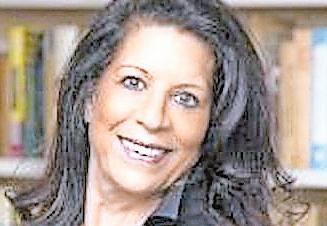
The train from Jerusalem to Herzliya hums steadily along the tracks. It’s full, as usual, for this time of day in the middle of the week.
Voices mingle with the whir of the wheels. A mixture of languages — Hebrew, English, Russian — meld with universal sighs of weary commuters wishing to reach their destination before sundown.
Suddenly, a minyan of 10 men rises, almost simultaneously. One stands, calling out the afternoon prayer, his Yemenite accent ringing clear above the din. The others follow his lead.
There’s a tall, blond tourist with a thick beard who boarded at Ben-Gurion International Airport, luggage in tow. His faded jeans hang as loosely as his tzitzit . Beside him is a clean-shaven local with olive skin in a crisp white shirt and black pants, wearing a dark velvet kippah . He’s holding a siddur . The rest read the text on their electronic devices.
The words of Mincha, the afternoon prayer, followed by Selichot fill the car, soft yet commanding. Strangers mumbling in chaotic unison.
When they finish, they nod, smile and shake hands. The leader sits down again and phones his office. Holy duty behind
OWherehim, he tends to his real-estate business without skipping a beat … or minding that his conversation’s being heard by eavesdroppers.
Across the aisle, a young female IDF officer with a rifle nestled between her shoulder and lap barely notices. She takes Jews for granted.
Anyway, she’s busy texting her boyfriend to find out if he’s been called up yet again to fight in Gaza. Her long pink nails — the hue of her furry cellphone cover — click furiously on the screen.
A mother nearby leans close to her son. The 9-year-old (she mentioned his age) was fidgeting about his audition for a TV show that evening. She glances nervously at her watch; they’re running late. She calls his agent to announce the delay, then asks a passenger for directions to a certain address in Tel Aviv.
He looks it up for her on the Moovit app, adding a few tips of his own. She responds by declaring that she can’t stand Tel Aviv.
“It’s too noisy and dirty,” she says, revealing that she lives in Haifa.
“At least Tel Aviv doesn’t have all those oppressive hills,” he retorts. They laugh and shrug, agreeing that traffic is terrible everywhere today, in any case. Anti-government protesters are blocking the highways again.
By the doors, a young couple stands guard over their electric bikes. They’re arguing about Egypt. And Washington. And whether the demonstrations are helping or harming the hostages. Their tones rise and

fall, frustration infused with flirty familiarity.
Three boomers with gray braids pass the pair, their Israeli flags sticking awkwardly out of backpacks and under arms. They’re heading to Hostages Square outside of the Tel Aviv Museum of Art.
The train halts between stations. The conductor apologizes over the loudspeaker for the mishap.
“Is this because of the protests?” an elderly man inquires of nobody in particular.
A woman with a small dog on a leash shakes her head. “No, no,” she answers. “It’s probably due to electrical failure last week.”
“You mean because of the heat wave or the Houthi missile attack?” he wonders aloud.
The train resumes moving. Relief, like ca maraderie, is palpable.
Nothing remarkable. And everything. A snapshot of the Israel I love.
Write: Columnist@TheJewishStar.com

nce upon a time, people celebrated heroes for what they did — for their courage, for defending justice and for paying the price for standing up for what was right. Today, a few loud slogans, a scandalous interview or a good social-media photo dump is all it takes, and suddenly, a criminal becomes a legend. The public cheers, the media puts them on a pedestal, and the facts are drowned out. It feels as if we are living in a world where cheaters, con artists and professional loudmouths get stages, kudos, films and fan clubs, while those who promote facts stand in the corner like unnoticed guests.
Once upon a time, traditional storytelling and Hollywood filmmaking were full of character-building archetypes, where the good win and the bad get their well-deserved punishment. Yet today the script has flipped. Evil gets applause, and the good only makes it to the credits.
Unfortunately, this troubling phenomenon isn’t limited to films.
Let’s start with Kneecap, the Irish rap group that has been crowned as Gaelic heroes, with anti-British lyrics and a fitting biopic. Fans love their “rebel” energy, which includes chanting “Brits Out,” flirting with IRA nostalgia and using lyrics and posts that critics interpret as a call for violence against Tory members of the UK Parliament.
At the 2025 Coachella Valley Music and Arts Festival in Southern California in April, they wished death on Israel while glorifying Hamas and Hezbollah. Most recently, in a video message played at the Hungarian Sziget Festival this summer, they called

on their audience to “Oppose Orbán. Oppose Israel. Oppose genocide. Free Palestine.”
British authorities labeled the band “unacceptable,” and investigations were launched for incitement to violence. Hungary banned the group from entering the country for three years based on their rhetoric tied to a terrorist organization.
Yet the organizers of the Sziget Festival, a private company, turned Kneecap into festival favorites by allowing their video message to be played on the main stage because, it seems, swearing at the current government, threatening its prime minister, Viktor Orbán, and inciting hatred against a sovereign country is totally “cool.” Shouting about murder is just primetime entertainment.
Then there’s Mahmoud Khalil, the proPalestinian poster child at Columbia University. US Immigration and Customs Enforcement (ICE) held him for more than 100 days for alleged lies on his green-card application, and for using his university presence to “incite hatred against Jews” and promote intifada. He aided protesters at Columbia, who eventually
occupied buildings, attacked Jewish and pro-Israel students and professors, and set up tent encampments on campus. Khalil lied on his green-card application, and when ICE took him into custody, he was celebrated by many as a “double refugee” martyr.
Released on bail, he returned to New York City, posed for photos with New York state assemblyman Zohran Mamdani — a Democratic Socialist and mayoral candidate for the Democratic Party — and continued chanting for people to “globalize the intifada.”
President Donald Trump called Khalil radical. Legal documents show that he supported violent acts against Jews. He still faces deportation, but the protesting crowds see him as a hero. Is detention and prison a new VIP badge?
Then there’s the rising political star Mamdani himself. He comes from an elite, wealthy family but poses as poor, feeding Marxist mantras to young Americans. On his Columbia admissions application in 2009, he marked “black or African American” and “Asian,” although he was born in Uganda and is of Indian descent. A data leak exposed the lie, and he wasn’t admitted.
While Mamdani claimed that he wanted to indicate his “complex” Indian-Ugandan heritage, current New York City Mayor Eric Adams called it a “deeply offensive” trick to exploit affirmative action. Despite his deceptions, Mamdani’s progressive rhetoric has made him a darling of young voters. Faking Ivy League applications is evidently an OK stepping stone for becoming a mayor in New York.
Then we have, for us Hungarians, Péter Magyar, the current golden boy opposition
Why do people love villains?
leader of the Tisza Party, who has rebranded himself as an anti-corruption crusader. Yet he has allegedly harassed his now ex-wife, former Minister of Justice Judit Varga, and his lies fall as fast as summer flies. He vowed never to enter politics, then launched an “opposition” party weeks later. He claimed that he would skip Brussels as a member of the European Parliament and then took his seat anyway. Yet fans celebrate him as Hungary’s authentic savior. It seems that in 2025, deception is merely “calculated reinvention.”
Why do people love villains? Because of a mix of human foolishness and social conditioning. Sociologists call it the “Robin Hood” effect: Break the law against the “oppression,” and suddenly, you’re a rebellious star. Émile Durkheim argued that rule-breakers can reshape society, but today’s “heroes” often exploit this for fame rather than actual progress.
And the media adores “bad guys,” they’re what sells, and if they also fit the currently pushed narrative, such as anti-colonialism, anti-racism, anti-Western ideology, etc., then they become a legend.
If they can be labeled as a “victim,” their crime disappears faster than a TikTok trend. So here we are as a society with people loudly celebrating cheats and aggressors, while facts gather dust. And as society elevates criminals over quiet heroes, it erodes the moral foundation that holds people together, rewarding spectacle over substance. It is time to demand better heroes; those who earn their status through sacrifice and integrity, not scandal and spin.
Write: Columnist@TheJewishStar.com
Continued from page 18
ers, professors and admissions, creating leftwing bubbles where antisemitic denial of Jewish history and rights became normative.
And as “free Palestine,” the phrase that has come to encapsulate a belief in destroying the State of Israel and demonizing Jewish peoplehood, became the primary obsession of the American left, the Oct. 7 terrorist attacks helped mobilize students, faculty, school employees — aided and abetted by outside agitators and funders — to turn campuses into hostile environments for Jews.
So, while the people who run American higher education understood that the election in 2024 of a president who prioritized the fight against antisemitism endangered their businesses, the inmates of these academic asylums remain just as interested in turning the fall 2025 semester into another ordeal for Jews and supporters of Israel.
Nor has the funding for these antisemitic groups, like Students for Justice in Palestine and others, from both foreign sources, such as the
Continued from page 17
noticing strengthens our spiritual reflex not to suppress the natural instinct to help. Slowly, we become more attuned to the inner voice of lo suchal lehis’aleim.
Elul itself carries this same message. The Rambam writes that the blasts of the shofar in this month are meant to say: “Uru yesheinim mishinaschem, wake up from your slumber.” We are called not to look away from our own lives.
We are called not to bury what we know we must face. Elul is the time when Hashem leaves His palace and enters the field. He is close and available, ready for us to notice Him. The only question is whether we will open our eyes or whether we will convince ourselves that we are too distracted and too busy to see.
The truth is that Elul is the season of lo suchal lehis’aleim. It is the time of year when the Torah calls us to stop ignoring the quiet whispers of our own conscience. We all know the areas where we need to grow. We all know the conversations we have been putting off, the relationships that need mending, the mitzvos that have slipped away. Elul says to us: do not look away. Do not make yourself blind. That morning, I closed the laptop and smiled at my son. The sermons eventually will get written. They always do. But that moment was irreplaceable.
That moment was a gift. That is the avodah of Elul. It is to stop, to notice, and to respond. It is to train our hearts not to turn away so that when we stand before Hashem on Rosh Hashana, we can say that we have learned to truly see. To see the needs of others. To see the presence of G-d. And to see the precious moments that fill our lives. That is the timeless call of lo suchal lehis’aleim. Do not ignore what is right before you. Do not convince yourself you are too busy to notice. Do not bury the voice that calls you to love, to responsibility, to teshuvah, and to the Almighty.
Write: Columnist@TheJewishStar.com
Continued from page 17
brokenhearted and saves those who spirits are crushed” (34:19); “He heals the brokenhearted and binds up their sorrows” (147:3); and “A broken and crushed heart, O’ G-d, you will not despise” (51:19).
The Kotzker Rebbe famously comments on
emirate of Qatar and left-wing foundations like those controlled by the Soros family, dried up.
One factor that may alleviate the problem has been Trump’s focus on the role of foreign students in campus disturbances.
Trump hasn’t yet banned the entry of students from abroad, especially Muslim-majority countries. Nor has he succeeded, as he still hopes to do, in deporting some of the leaders of the pro-Hamas and antisemitic illegal demonstrations and takeovers.
Syrian-born Mahmoud Khalil, who helped lead the chaos at Columbia, has been able to remain in the country, despite the administration’s best effort to deport him.
Many other foreign students, who make up significant percentages of the student bodies of many leading schools like New York University, the Massachusetts Institute of Technology, Harvard and Columbia, have essentially self-deported since they, like Khalil, have undoubtedly lied on their visa applications and are vulnerable to legal action.
Others who were similarly intent on coming to the United States to benefit from the education system here while undermining the values
the verse that “nothing is so dear to Hashem than a broken heart; nothing is as whole in the eyes of Hashem, as a broken heart”. But what does that mean? Does Hashem want us to have a broken heart?
Before answering or even attempting to answer this profound and troubling question, it is clear that no question could be more appropriate for our time than this one. Not just because it is Elul and we approach Hashem and the Yamim Noraim with hearts filled with thoughts of teshuva and anticipation of forgiveness. No, it’s because for the past 11 months we have all been functioning or attempting to function with ever present, broken hearts.
Since the horrors of Shmini Atzeret 5783, all of us have had an individual and collective broken heart.
But perhaps the most broken hearts of all are those who have time after time been tortured by the hope and expectation of a hostage release, only to have those hopes cruelly dashed by a barbaric enemy and tormentor, and in the most cruel act of all, to have those hostages murdered, only minutes or hours before their rescue.
One need only hear the anguish in Rachel Goldberg-Polin’s voice to even have a fraction of understanding of the depth of heartbreak that she and all the others carry within themselves, always, all the time.
So what does Hashem want from us? He does not want us to have a broken heart!
The Kotzker’s typically opaque language summarized as “there is nothing so whole as a broken heart” reveals an underlying and deeper truth — that Hashem, filled with compassion, desires most of all the prayers and closeness, the dveikut, to Him of those whose hearts are broken, because he so desperately wants to “heal those broken hearts and bind their sorrows.”
It is fitting that the poetic verses in Tehillim, which fill us with hope and comfort, were written by David Hamelech, who suffered all of his life with great pain, anguish, stress, and tribulation. Yet he never lost his love or faith in G-d. His words of Tehillim are filled with songs of gladness, happiness and thanksgiving, words we recite every day and especially on the chagim
David Hamelech was able to transcend a life of incredible, unceasing heartbreak, give us some of the most powerful and inspiring messages the human ear has ever heard, and still pursue fulfillment and happiness through closeness to G-d — and despite his many faults and failings as a human being,
of the American republic and spreading Islamist doctrines have taken Trump’s hint and decided not to come to the United States this fall.
But there are likely enough still here, along with a cadre of leftist activists, to create havoc at schools in the name of the supposedly starving Palestinian people and against Israel.
Averting another situation such as the one that unfolded after Oct. 7 will require two things to happen.
One is that the Trump administration must be prepared to double down on its threats against colleges and universities that behave as they did two years ago and let antisemites run amok.
Moreover, rather than work solely toward striking more deals with schools, such as the one they struck with Columbia, Trump’s team must escalate their efforts to pull funding and force them to give up their DEI bureaucracies, as well as dismantle those departments, like those in Middle East studies, that are engines of antisemitism.
At the same time, those whose job it is to defend Jews, in general, like the Anti-Defamation
became the father of Melech HaMoshiach!
The Zohar tells us, “There is no light greater than the light that emerges out of darkness.”
We can all agree that we are in a profound darkness, our hearts are broken and filled with sorrow. And that just as after the indescribable darkness and sorrow of the Shoah, Hashem granted us the light of the birth of the State of Israel, the beginning of the sprouting of our redemption, we beg you, we beseech you Hashem, that you bring us the light of the complete redemption.
We see this in next week’s haftarah for Ki Savo, Isaiah (60:1-22):
Arise! Shine! For your light has arrived, and the glory of Hashem has shined upon you.
And in Isaiah (60:19):
For you shall no longer have need of the sun for light of the day, nor the brightness of the moon to illuminate you, rather Hashem shall be unto you an eternal light, and your G-d for your glory.
Please Hashem, the time has come. Help us mend our broken heart. Bring us the light.
Write: Columnist@TheJewishStar.com
There’s been no shortage of murderous antisemites seeking to destroy us “in every generation.” But because of their wanton treachery Amalek has become a pseudonym for any arch enemy of Israel throughout the ages. Though they had no biological or historical connection to Amalek, the Nazis were referred to by the Jews of the Holocaust period as the “Amalekites.”
A recent sermon by a colleague in Johannesburg, Rabbi Nesanel Schochet, noted a fairly new expression called “donor fatigue,” which refers to the many demands made on people of means to support a growing number of institutions and causes. The verse in our reading this week speaks about “spiritual fatigue.” Amalek attacked us when we were “faint and weary.”
When we suffer from religious fatigue — when we are tired and uninspired — that’s when we are most vulnerable to the Amalek within us. Yes, believe it or not, there is a little Amalek inside each of us. That voice of negativity, that compulsion to evil and wrongdoing and the denial of our inherent faith are all symptoms of Amalek in a more subtle, mys-
League and American Jewish Committee, and Jewish students, in particular, such as Hillel International, need to understand that they must cease opposing Trump’s efforts to reform academia and end DEI.
Measures that are supposed to aid Jewish students that do not attack the reasons why they are under attack are useless and say more about the bankruptcy of many leading mainstream Jewish groups than anything else.
The coming months may prove trying for American Jews as they undergo another trial by fire, fueled by lies about Israel. The same leftistIslamist alliance that has done so much damage in the last two years seeks to ignite another storm of antisemitism on campuses.
Still, they need to remember that they are not alone in this fight. Trump’s prioritization of the fight against Jew-hatred has put colleges and universities that would otherwise be inclined to abandon their Jewish students on notice that there will be a cost to doing so.
We can only hope that this will be enough to force school administrations into actions that will finally rid academia of this scourge.
Write: Columnist@TheJewishStar.com
tical sense. When we are “faint and weary” spiritually, that’s precisely when we are most susceptible to the blandishments of those Amalekite tendencies.
I’ve often argued that the biggest threat to Jewish survival lies not in our enemies’ never-ending wars to wipe us out, but in our own internal moral weakness — lack of faith, unity, commitment and resolve. It can almost be summed up in one word: apathy.
Some years ago, we hosted for Shabbat a group of young Jews from Vilna (Vilnius) in Lithuania who were generously gifted a vacation in South Africa. At the Kiddush after the Shabbat-morning service, David, a young man of about 18 years old, spoke on behalf of the group. Among other things, he said, quite matter-of-factly: “Last year when I had my brit.”
I promise, you could hear an audible gasp from the hundreds of men in the audience. Here was a young man who was only circumcised at age 17. Today, there are thousands of such Jews all over the Former Soviet Union who are happily agreeing to undergo this sensitive surgical procedure at all ages, including many who are much older than a late teen. Most have only just discovered their Jewishness and the traditions involved in being a Jew. (For myself, and probably all of my male readers, I can only say thank G-d my parents gave me a brit in my infancy.)
David was inspired to have a brit milah He was not “faint and weary.” He was alive and on fire, enthusiastically embracing his faith and the Jewish rite of passage. When we are vibrant like that — passionate about our faith, history and peoplehood — no enemy on earth can harm us.
I remember hearing a speech by Ronald S. Lauder, president of the World Jewish Congress, on a visit to our community some years back. He was responding to people who complained about Israel’s ineffective public relations on the international stage and in the media.
His response? “We’ve been failing in our public relations for 3,000 years!” And we’re still here to tell the tale.
We cannot, however, afford to be “faint and weary.” Apathy and indifference to the Jewish cause, especially among young Diaspora Jews, endangers our survival more than Hamas, Hezbollah or the Houthis.
When we ourselves will be alive, awake and passionate about our national destiny then can we truly and proudly proclaim with confidence, “Never Again!” Write: Columnist@TheJewishStar.com
Continued from page 17
Much closer to our time, at the beginning of the last century, Rabbi Israel Meir Kagan of Radin (the Chofetz Chaim) became convinced that the central evil of modern times was the abuse of words. So confident was he of the certainty of his diagnosis of the social ills of our time that he devoted a major work to the subject of lashon hara. The name of that work is “Desirous of Life,” after the verse in Psalms, which reads, “Who is the person who desires life? Let him guard his tongue against speaking evil.”
Recalling Miriam’s misdeeds, and taking seriously the comprehensive teachings of the author of Chafetz Chaim, is especially valuable today. Because words have become even more powerful and potentially destructive than a rabbi living a hundred years ago could possibly imagine.
Nowadays, through the power of electronic instant communication, words can be sent to millions of people in microseconds. If these words are negative, they can harm individuals instantly, without even the possibility of recourse or recall. The power of words has exponentially increased in scope and effect in our day and age.
Our tradition teaches that using words to offend another human being is akin to a snake and its venom. The snake’s venom kills, yet the snake has no benefit from its fiendish action. So too, human beings usually benefit from every other sin imaginable, but gain nothing by harming others verbally. Because of this, lashon hara is the least justifiable of sins.
Not a day goes by when we do not receive e-mails or read Internet reports which damage reputations of individuals, without due process and without the remotest possibility of defending themselves. This goes against both our Jewish heritage and our democratic ideals in a very fundamental way.
It is already the first week of Elul, the last month of the Jewish year. At this time, it behooves us to introspectively examine our faults. It is the season of teshuvah, repentance, which precedes and heralds the imminent High Holidays. We must give thought to how we have offended others with words and with deeds.
Although the unimaginable spread of verbal abuse that postmodern technology has instigated is beyond the capacity for any one of us to correct, we have no option but to try individually to control the way we use words and the words which we use. None of us is innocent of lashon hara, and none of us is exempt from sincerely addressing this weakness.
In conclusion, I call to your attention the rabbinic dictum that the power of Good exceeds the force of Evil manifold.
Imagine if emails were limited to complimentary statements and words of praise. Imagine if the blogs and websites were replete with stories of human accomplishment, altruism, and heroism. It would be a happier world for sure.
And it would be a world closer to that which the Almighty intended. Now, less than a month before Rosh Hashanah, is the ideal time for each of us to commit, in a deeply personal way, to bring about that better world.
Write: Columnist@TheJewishStar.com
Continued from page 19 their list of Australian Jewish intelligence targets.”
The courageous Moore-Gilbert added that after her release in a prisoner swap, she debriefed Australian intelligence about this particular encounter. Yet Iran was still able to carry out its attacks in Australia four years later.
Australia has provided us with a textbook case of what happens when a country fails to wake up to the Iranian threat. Indeed, Iran’s record beyond Australia’s borders should have been enough to set off the alarm bells in Canberra. During the last two years, Iran has either carried out attacks or attempted them in several countries where the Islamist regime maintains an embassy, including Sweden, Germany and the United Kingdom, as well as those, like the US and Canada, where it doesn’t.
To get a fuller sense of Iran’s terror footprint, we must go back to the early 1980s, when the founder of the Islamic Republic — Ayatollah Khomeini — was still in power. In the closing decades of the last century, Iranian suicide bombers massacred US Marines in Beirut and blew up the Israeli Embassy, and then the AMIA Jewish center in Buenos Aires, among many other outrages, causing several hundred casualties, dead and wounded.
The critical difference with the present is that the Iranian regime has rarely been as weak as it is now. Its regional proxies in Lebanon, Gaza and Syria have been badly, perhaps irreparably, damaged. Its nuclear-weapons program has been set back for several years, thanks to the combined Israeli and US strikes on Iranian nuclear facilities in June. Its rulers have been frantically looking over their shoulders as they acknowledge among themselves the extent of Israeli intelligence penetration of key departments and agencies.
Nevertheless, Iran’s determination to rebuild its nuclear program hasn’t wavered, which is why the foreign ministers of the E3 — Germany, the United Kingdom and France — decided last week to trigger the sanctions “snapback” mechanism first agreed when the US-led nuclear deal with Iran was announced 10 years ago. What that means is that by the middle of October, the heavy restrictions on Iran in place before that flawed deal — impacting weapons, nuclear development, and economic and trade policy — will have been restored unless the regime manages in the interim to persuade an increasingly skeptical world that it will verifiably cooperate with the dismantling of its nuclear program.
As the UN General Assembly prepares for its annual debate in September — with rumors abounding that member states with far-left governments like Colombia are pushing for the suspension of Israel from the global body — the correct countermove is to isolate Iran even further with the goal of making this year’s meeting the last to be attended by the regime.
Western states, which could become the main focus for Iranian terror now that its regional proxies have been emasculated, should follow
the Australian move by severing all diplomatic ties with Tehran.
For too long, the ayatollahs have been indulged by Western diplomats even as they draw closer to their fellow states in the axis of aggressors, like Russia, China and North Korea. Those days must now come to an end.
Write: Columnist@TheJewishStar.com
Continued from page 20
States and allied governments.” And now he’s been given free rein to spread his dangerous rhetoric at Yale. This alone should disqualify him from his post.
The Islamic Republic is evil, but it is not competent. Like all failing dictatorships, violence and deceitful strategies are used to maintain
legitimacy. That’s why the regime’s main “soft power” is manipulating the world’s ignorance. Unfortunately, it is succeeding with classes like the one being taught by Malley.
Unlike Iranian students who face imprisonment and death for demanding academic freedom, students in the West have the privilege to demand accountability and transparency from their institutions without fear.
Past and present Yalies need to reach out and demand an explanation for their school’s hiring policies. The school should impose an audit on Malley’s class and put more effort into supporting diverse views on Iran. Additionally, all community members interested in maintaining Yale’s reputation as an elite institution should protest this blatant attempt to indoctrinate students. Hadi Mahdeyan is an international student from Iran, a 2025-2026 CAMERA on Campus fellow and Yale College student studying electrical engineering with a certificate in Persian and Iranian Studies. Write: Columnist@TheJewishStar.com

Deliver newspapers (The Jewish Star and others) to stores and buildings in Queens, Riverdale and Westchester
Excellent income opportunity. Assignments on Wednesdays and Thursdays with possible additional work. (Your vehicle.)

Power Driver Seat, Smart Key System, Push Button Start, Blind Spot Warning, Wireless Apple CarPlay, Wireless Android Auto, Wireless Phone Charger, Bi-LED Headlights, Toyota Safety Sense 3.0, and Much More!








Leather Seating, Parking Sensors, Panoramic Moonroof, Roof Rails, 360° Camera, Wireless Apple CarPlay, Wireless Android Auto, Trailer Hitch, and Much More!


8 Passenger, Leather Seating, Navigation, Rear Entertainment, Parking Sensors, Power Trunk, Moonroof, and Much More!

36m lease, 7.5k miles/year




